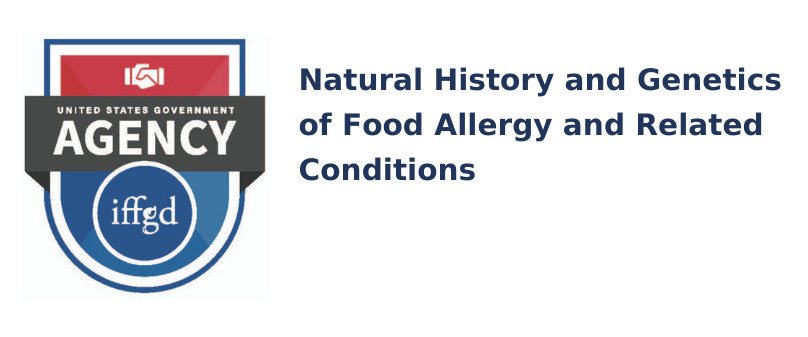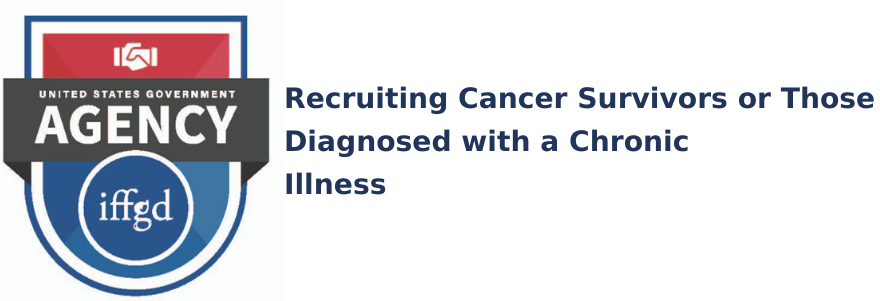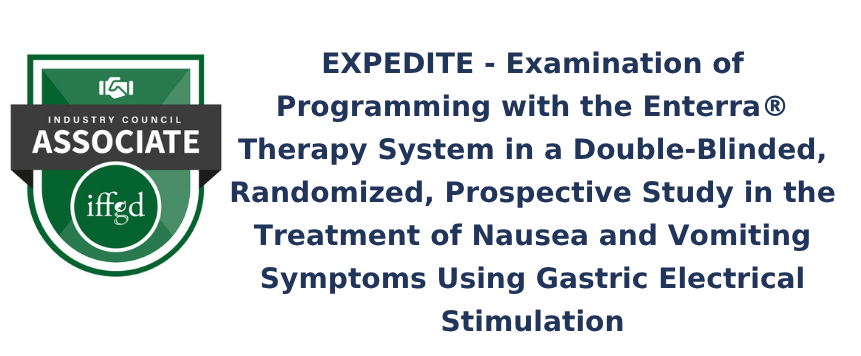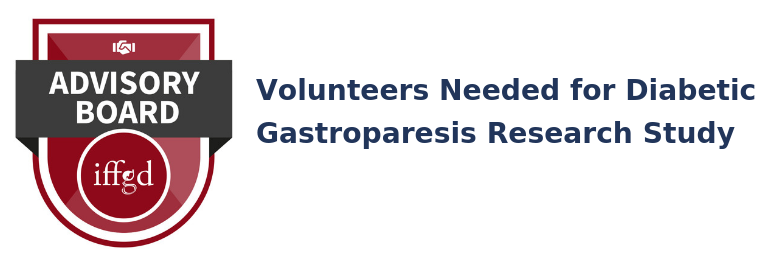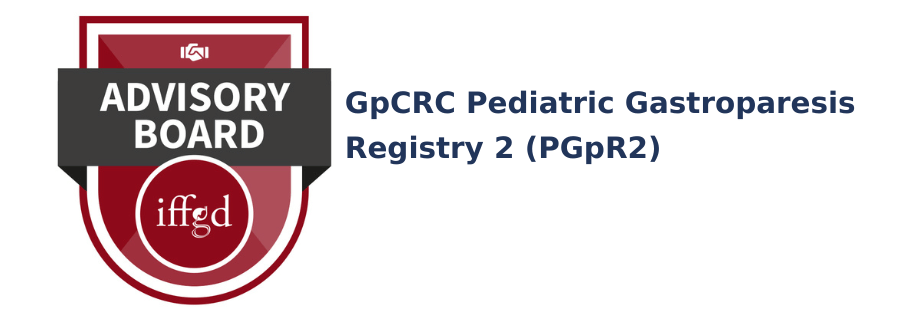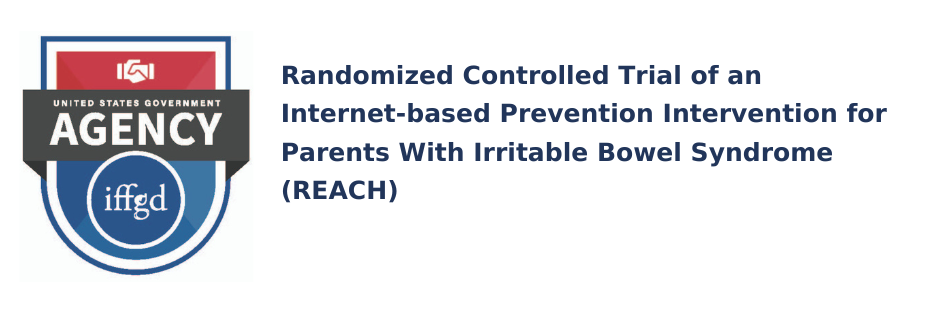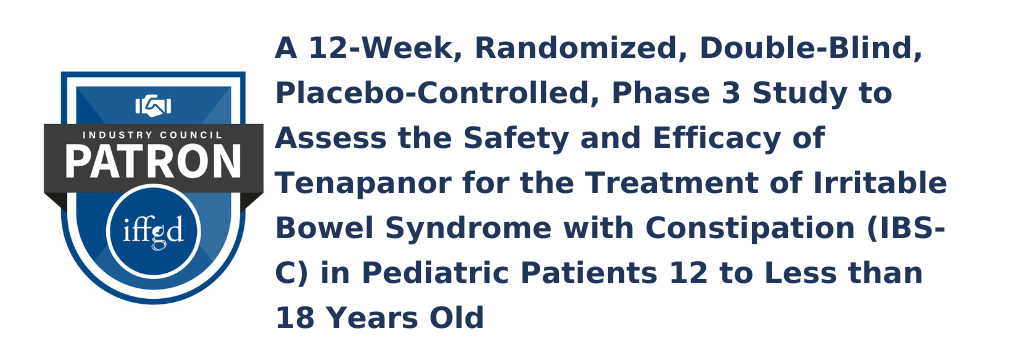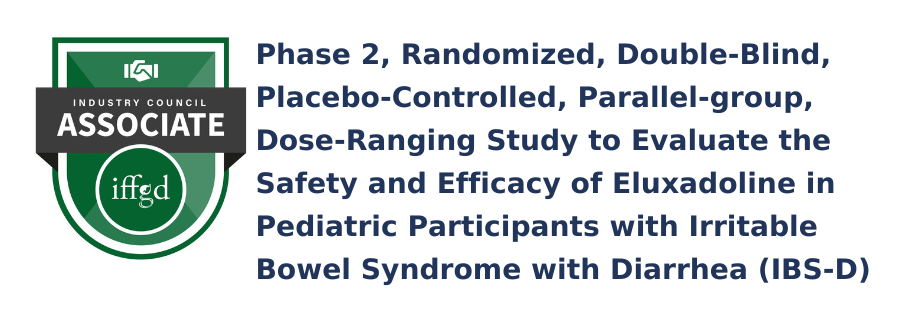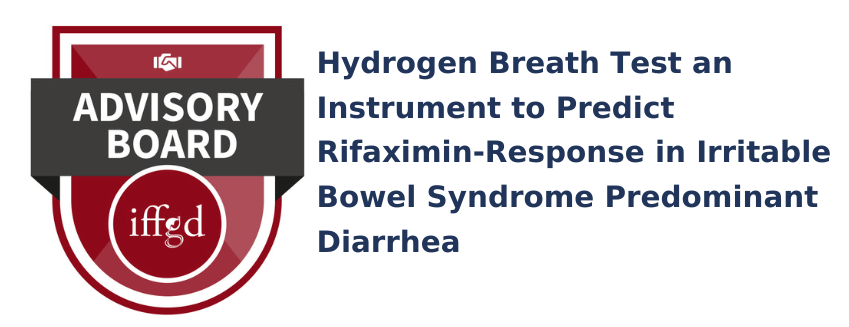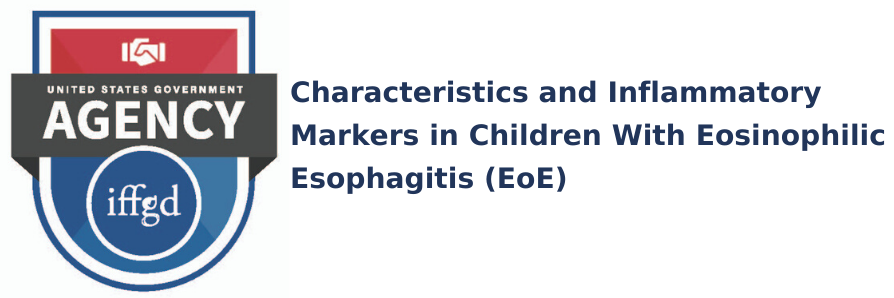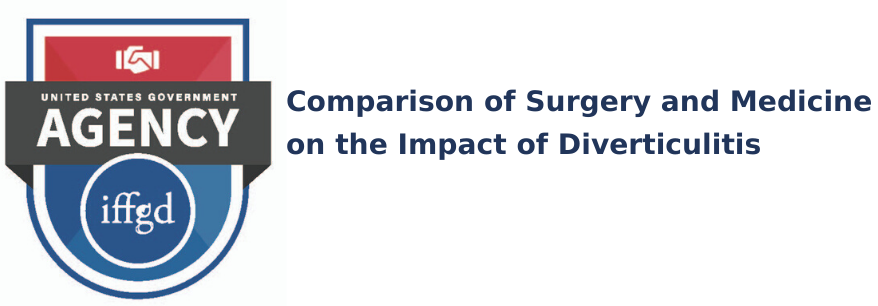
Clinical trials and or studies are an important way for us to learn more about GI Illnesses and help us find better treatment options. Participation in clinical studies or trials offers one way to help advance research into gastrointestinal (GI) disorders. Here is a list of clinical studies, in adults and children, that are seeking participants. A description of the study purpose and contact information is included.
Check out our Digestive Health Monthly eNewsletter for highlighted Clinical trials each month
Studies Looking At:
A
B
C
- Celiac Disease
- C. difficile infection
- Chronic Intestinal Pseudo Obstruction (CIPO)
- Coexisting Conditions
- Colorectal Cancer
- Congenital Sucrase-Isomaltase Deficiency (CSID)
- Covid-19
- Cyclic Vomiting Syndrome
D
E
F
G
- Gastroesophageal Reflux Disease (GERD)
- Gastroparesis
- Genetic Motility Disorders
- Gulf War Multisymptom Illness
- Gut microbiome
H
I
L
N
P
R
S
All GI Disorders
Added May 2025
Purpose of Trial: Evaluating whether the Enterra Therapy System can reduce nausea and vomiting and improve quality of life in patients with chronic nausea (with or without vomiting) who have normal gastric emptying.
Sponsor: Enterra Medical, Inc.
Condition: Chronic nausea (with or without vomiting) who have normal gastric emptying
Study Start Date: 2025-04
Study Completion Date: 2027-12
Participation:
Inclusion Criteria:
- Willing and able to complete the informed consent process
- Stated willingness to comply with all study procedures and availability for the duration of the study
- Aged ≥18 years at time of informed consent
- Chronic, drug-refractory nausea that: a) has been present for more than 6 months, and b) has been active within the last 3 months prior to consent
- Patient is able to complete ANMS GCSI-DD surveys on a compatible smart device with: a) a minimum of four (4) ANMS GCSI-DD entries per week for two consecutive weeks, and b) an average ANMS GCSI-DD score for nausea severity of ≥2.5 during the same two-week period
- Refractory or intolerant to two or more of the following antiemetic drug classes: antihistamines, phenothiazines, serotonin type 3 receptor antagonists, dopamine type 2 receptor antagonists, anticholinergics, neurokinin receptor antagonists
- Medically stable, in the opinion of the investigator, during the month prior to consent, with no planned modifications to medical therapy during the course of the study
- Normal gastric emptying as assessed by a qualifying gastric emptying test performed within 1 year prior to consent
- Normal upper endoscopy within 1 year prior to consent (e.g., absence of obstructions, ulcers, or cancers in the esophagus, stomach, or duodenum)
Exclusion Criteria:
- Cognitive impairment or other characteristic that would limit a patient’s ability to complete study requirements
- Evidence of a delayed gastric emptying test result within 2 years of consent
- Documented gastrointestinal (GI) obstruction or pseudo-obstruction
- History of primary swallowing disorders
- History of primary psychogenic vomiting
- History of primary eating disorder
- History of cyclic vomiting syndrome
- History of rumination syndrome
- History of scleroderma
- History of amyloidosis
- History of cannabis hyperemesis syndrome
- Active H. pylori infection
- Evidence of bezoar during most recent endoscopy
- Previous gastric surgery of any type
- Uncontrolled thyroid disorder, in the opinion of the investigator
- History of seizures disorders
- Hemoglobin A1c >8.0%
- Peritoneal dialysis or unstable hemodialysis
- Parenteral or enteral nutritional support
- History of organ transplant, chronic pancreatitis, gross malabsorptive syndromes, celiac disease, or inflammatory bowel disease
- Other GI tract diseases and disorders that the investigator believes may have caused the patient’s drug-refractory nausea and/or vomiting
- Malignancy (with the exception of basal cell carcinoma of the skin) currently present, initially diagnosed or recurring within 5 years of consent
- Opioid use
- Current cannabis/cannabinoid use that exceeds: 3 days of usage per week, or 2 occurrences during each day of use, or 3 grams of total usage per week
- Heavy alcohol use, defined as: for men, consuming five or more drinks on any day or 15 or more per week; for women, consuming four or more drinks on any day or 8 or more per week
- Injection of Botox into the pyloric sphincter within 6 months of consent
- Active major levels of anxiety/depression, as determined by the investigator
- History of other clinically significant disease, or any other condition which, in the opinion of the Investigator, would jeopardize the safety of the patient or impact the validity of the study results
- Life expectancy <1 year
- Pregnant or breastfeeding at the time of consent or intend to become pregnant during the study
- Any underlying disease leading to follow-up by MRI outside of current MR conditional indications
- Glucagon-like peptide 1 (GLP-1) agonist drug use in 12 months prior to consent
- Participation in other investigational clinical studies
- Existing or prior gastric electrical stimulator implantation
Contact for Study: Timothy McAllister, clinicalresearch@enterramedical.com
Added March 2025
Treatment of Upper Gastrointestinal Symptoms Using Hypnotherapy Sessions
Purpose of the study: The purpose of this research is to evaluate if hypnotherapy delivered digitally will help your GI symptoms.
Sponsor: Mayo Clinic
Start date: 2025-02-20
- Patients will meet criteria for at least one upper GI DGBI including functional dyspepsia, any nausea/vomiting disorder, or functional abdominal bloating. Lower GI DGBIs, such as IBS, are allowable if the primary symptom is either an upper GI symptom or bloating/distension.
- Participants will have previously undergone test of gastric emptying of solids using the standardized Mayo Clinic scintigraphic method (4h 320kcal egg, 30% fat meal) and will have <25% retained at 4 hours to meet inclusion criteria. Patients with current untreated H. pylori infection will be excluded.
- Patients with known disaccharide intolerances may be included if dietary restrictions are maintained during the duration of the study.
- Patients utilizing cannabinoid based substances may be included if no dose changes are made during the duration of the study
- Patients will be proficient in English language for comprehension of content
- Patients will have reliable access to digital delivery systems for content and questionnaire access via smartphone over the course of the study and follow up period.
-
Mariah Robran, 507-266-3595, Robran.Mariah@mayo.edu
Added December 2024
Start date: 2022-05-27
Completion date:2025-07-31
Participation:
- 18-70 years old, able to read and speak English fluently and provide informed consent
- Travel or deployment with minimum of 10 consecutive days at intermediate to high risk for GH disruption destination (not counting quarantine period)
- Ability to complete a follow-up visit following return from travel
- Ability to provide a stool sample prior to start of prophylaxis
- Willingness to comply with study procedures
Contact for study: David R Tribble, MD, DrPH, (240) 694-2948, david.tribble@usuhs.edu
Added April 2024
Correlation of Toxins With Gastrointestinal (GI) and Overall Health
Purpose of study: The goal of this observational study is to evaluate the levels of urinary environmental toxins, heavy metals, PFAS and mycotoxins with gastrointestinal (GI) and overall health.
Sponsor: Vibrant America Clinical Lab
Start date: March 2024
Completion date: February 2025
Participation
Inclusion Criteria:
- Patients suffering from gastrointestinal and/or other symptoms
- Patients willing to provide urine samples
- Patients willing to provide consent
Exclusion Criteria:
- Use of antibiotics 2 weeks prior to the study
- Patients unwilling to consent
Contact for study:
-
Hari K Krishnamurthy, MS, 866-364-0963, hari@vibrantsci.com
Added September 2023
Cross-sectional 12-year Trends of the Eating Behavior Survey
Purpose of Trial: The purpose of this cross-sectional study is to examine psychological well-being and eating behavior practices among young adults with and without diet-related chronic health conditions such as inflammatory bowel diseases, celiac disease, irritable bowel syndrome, type 1 or 2 diabetes, and cystic fibrosis. Condition: N/A Treatment or Intervention: no treatment- cross-sectional study
Sponsor: Rutgers University, School of Environmental & Biological Sciences
Inclusion Criteria: 18-30 years old
Start Date: January 2022
Completion Date: November 2023
Contact for Study: Virginia Quick, vquick@njaes.rutgers.edu
Lower GI Patient Survey
Purpose of the study: To get perspectives from the GI patient community on disorders like irritable bowel syndrome, SIBO, and more. This survey takes approximately 5 minutes to complete.
Sponsors: Gemelli Biotech’
Start Date: April 2023
Contact: patientcare@triosmartbreath.com

Purpose of Trial: This phase III trial studies how well domperidone works in treating patients with gastrointestinal disorders. Domperidone may help control chronic gastrointestinal disorders and their symptoms, such as pain, bloating, and nausea and vomiting, by stimulating contraction of the stomach to increase its ability to empty itself of food.
Condition: FGIDs
Sponsor: M.D. Anderson Cancer Center
Collaborators: National Cancer Institute
Start Date: October 23, 2012
Completion Date: October 31, 2025
Participation:
- 16 years or older
-
Inclusion Criteria:
- Patients with GI disorders who have failed standard therapy
- Symptoms or manifestations of: a) gastroparesis; b) refractory gastroesophageal reflux disease (GERD) including persistent esophagitis, refractory heartburn, reflux-related laryngitis, and respiratory symptoms; or c) severe dyspepsia
- Completion of a comprehensive evaluation, including clinical history and physical examination, to eliminate other causes of their symptoms
- Patient has signed the informed consent document agreeing to the use of the study drug, domperidone
- White blood cell (WBC) with differential greater than 3,000/ml
- Alkaline phosphatase less than 1.5 x upper limit of normal
- Alanine aminotransferase (ALT) less than 2 x upper limit of normal
- Aspartate aminotransferase (AST) less than 2 x upper limit of normal
- Bilirubin less than or equal to 2 x upper limit of normal
- Blood urea nitrogen (BUN) less than 2 x upper limit of normal
- Creatinine less than 1.5 x upper limit of normal
- Stable hemoglobin greater than or equal to 8.0 g/dl
- Potassium between range of 3.0 to 5.5
- Magnesium level between 1.6-2.6 mg
Contact: Mehnaz Shafi 713-794-5073 mashafi@mdanderson.orgs
Added May 2022
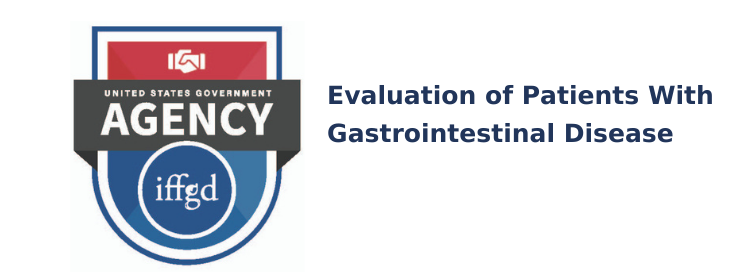
Purpose of Study: To collect data and samples from people being seen and/or treated for gastrointestinal problems at NIH, to use in future research.
Sponsors: National Institute of Diabetes and Digestive and Kidney Diseases (NIDDK)
Start Date: January 4, 2022
Competition date: December 31, 2035
Participation: See the Clinical Trials site for all inclusion and exclusion criteria
- 18 Years and older (Adult, Older Adult)
- Sexes Eligible for Study: All
- Accepts Healthy Volunteers: No
- Sampling Method: Non-Probability Sample
Contact:
- Beverly E Niles (301) 451-0659 beverly.niles@nih.gov
- Sheila Kumar, M.D. (301) 496-9730 sheila.kumar@nih.gov
Added June 2021
Purpose of Study: To learn more about the causes and effects of food allergy and related conditions.
Sponsor: National Institute of Allergy and Infectious Diseases (NIAID)
Participation: See study for all inclusion and exclusion criteria
- Be 2 to 99 years-old at the time of enrollment for participants who will be seen at the NIH CC; be 0 (newborn) to 99 years-old at the time of enrollment for participants who will submit mail-in samples or participate in telehealth visits. Only viable neonates will be enrolled.
- Willing to allow storage of blood, buccal swabs, saliva, nasal swabs, stool samples, and other clinically appropriate tissue specimens for future use in medical research
- Required to have a primary care or other physician who will manage all health conditions related or unrelated to the study objectives
Start date: July 29, 2015
Completion date: June 15, 2025
Contact: Caeden Dempsey by emailing at niaidfars@niaid.nih.gov
Added May 2021
Advanced Gastrointestinal Endoscopic Imaging
Purpose of Study: To develop new methods to detect malignant and premalignant conditions of the gastrointestinal tract
Sponsor: Stanford University
Completion Date: December 2025
Participation: See study for all inclusion and exclusion criteria
- patients be at least 18 years of age,
- Either genders
- All ethnic backgrounds will be considered.
- Patients who are scheduled for endoscopy by one of the investigators will be asked if they are interested in participating in the study.
- The study will be open to all patients undergoing endoscopy that do not have exclusion criteria.
- We will ask all patients if they are participating in any other studies. If they are participating in any other study then we will ask them for more information to determine whether there could be any harm from participating in both studies and if there is then they will not be enrolled.
Exclusion Criteria: Advanced Gastrointestinal Endoscopic Imaging
- Patients with unstable vital signs will not be included.
Contact:
- Cancer Clinical Trials Office (650)-498-7061 or email at ccto-office@stanford.edu
Purpose of study: The National Institute of Nursing Research (NINR), at the National Institutes of Health (NIH) is seeking people who are cancer survivors or have a chronic illness such as myalgic encephalomyelitis (ME), chronic fatigue syndrome (CFS), Sjogren’s disease, or Lupus to participate in a research study on fatigue. Fatigue is a common side effect of various illnesses. Researchers want to test if a one-time dose of the medication Ketamine or a similar drug can reduce fatigue. This is not a treatment study for fatigue, cancer, ME, CFS, Sjogren’s disease, or Lupus. Study procedures and medications are provided at no cost. Travel costs for study visits will be reimbursed in accordance with NIH guidelines.
Sponsor: National Institutes of Health (NIH)
Participation:
You may participate if you:
• Are at least 18 years old
• Have experienced fatigue for at least 6 months
• Are in cancer remission or have a diagnosis of ME, CFS, Sjogren’s disease, or Lupus
You may NOT participate if you:
• Have HIV, Hepatitis B, or C
• Have post-traumatic stress disorder (PTSD) or a traumatic brain injury
• Are pregnant or nursing
*Please note that NINR employees/staff or their immediate family members are not eligible to participate.
About the study:
• 9 visits to the NIH Clinical Center and 3 follow-up phone calls
• You will receive doses of Ketamine and an active drug (active placebo)
• You will complete questionnaires, assessments, and give blood samples
• This is an outpatient study that may last approximately one month
Contact:
NIH Clinical Center Office of Patient Recruitment
866-444-1132
Email: PRPL@cc.nih.gov
Added August 2019
Online Registry of Individuals with a Functional GI Disorder
Purpose of study: Participants sought for inclusion in a registry of individuals with functional GI disorders, in order to acquire a pool of individuals for contact for future studies.
Sponsor: Macquarie University, Australia
Participation: Any individual with a functional GI disorder and some level of abdominal discomfort is invited to participate.
About the study: Individuals included in the registry may be invited to participate in future research studies conducted by online questionnaire.
Contact: For more information, visit www.mqedu.qualtrics.com or email precise@mq.edu.au.
Amyloidosis
Added January 2022
ConTTRibute: A Global Observational Study of Patients With Transthyretin (TTR)-Mediated Amyloidosis (ATTR Amyloidosis) (ConTTRibute)
Purpose of the study:
- Describe epidemiological and clinical characteristics, natural history and real-world clinical management of ATTR amyloidosis patients
- Characterize the safety and effectiveness of patisiran as part of routine clinical practice in the real-world clinical setting
- Describe disease emergence/progression in pre-symptomatic carriers of a known disease-causing transthyretin (TTR) mutation
Sponsor: Alnylam Pharmaceuticals
Start Date: November 23, 2020
Completion Date: December 2030
Participation: See study for all inclusion and exclusion criteria
- Child, Adult, Older Adult
- Male and female
- NOT Accepting healthy volunteers
Contact:
- Alnylam Clinical Trial Information Line 1-877-ALNYLAM clinicaltrials@alnylam.com
- Alnylam Clinical Trial Information Line 1-877-256-9526 clinicaltrials@alnylam.com
Covid-19
Long-term Impact of Infection With Novel Coronavirus (COVID-19) (LIINC)
Inclusion Criteria:
- Willing and able to provide written informed consent, and
- Age >/= 18 years, and
-
A history of SARS-CoV-2 infection, as evidenced by:
- Available laboratory documentation of SARS-CoV-2 RNA positivity on a nucleic acid amplification test or by serologic testing when this becomes available, or
- Reference by the participant to a laboratory test performed on respiratory tract secretions or blood, fingerstick, or saliva test that was reported to the participant to be positive for SARS-CoV-2 or COVID-19 infection,
- And a period of 21 days or more has elapsed since the first positive test or symptoms preceding the first positive test, whichever is earlier.
Coexisting Conditions
Added March 2025
Purpose of Trial: The goal of this study is to measure the effects of using Tradipitant after GLP-1R agonist use on nausea and vomiting in healthy overweight, class I, or class II obese volunteers. The study is placebo-controlled with two treatment arms.
Sponsor: Vanda Pharmaceuticals, Inc.
Condition or Disease State: Obesity
Study Start Date: 01/26/2025
Study Completion Date:
Participation:
Inclusion Criteria:
- Body Mass Index 25-40 kg/m^2 inclusive
- No serious medical problems or chronic diseases, specifically no type I or type II diabetes
Exclusion Criteria:
- Another disorder that contributes to gastrointestinal symptoms
- History of intolerance and/or hypersensitivity to NK-1 receptor antagonists
- History of intolerance and/or hypersensitivity to GLP-1 receptor agonists
- Exposure to any investigational medication within the past 60 days
Contact for Study: clinicaltrials@vandapharma.com
Relationship Between Alterations in the GI Microbiome and GI Inflammation on Symptom Burden in Women with Breast Cancer Receiving Chemotherapy
Purpose of the study: This study evaluates the relationship between alterations in the GI microbiome and GI inflammation on symptom burden in women with breast cancer receiving chemotherapy.
Sponsor: Mayo Clinic
Start date: 2024-03-22
Completion date: 2026-03-30
Participation:
- Female with a new diagnosis of breast cancer (stage I-III)
- Age 20 or older
- Able to read and write in English
- Chemotherapy naive and beginning the first cycle of moderately or highly emetogenic chemotherapy (For example, Taxotere + cyclophosphamide treatment +/- trastuzumab). Patients who have not received chemotherapy for five years or more are considered chemotherapy naive
Contact for study:
- Clinical Trials Referral Office Phone, 855-776-0015, mayocliniccancerstudies@mayo.edu
Barrett’s Esophagus
Added January 2025
Multi-Site Detection of Barrett’s Esophagus in Patients Without Chronic GERD Symptoms
Purpose of trial: The goal of this clinical trial is to develop a method to detect Barrett’s esophagus in individuals with a new office-based diagnostic test. Barrett’s esophagus is a condition in which the flat pink lining of the swallowing tube that connects the mouth to the stomach (the esophagus) becomes damaged by acid reflux. The main question it aims to answer is: Can this approach demonstrate efficacy for screening of Barrett’s esophagus?
Sponsor: Case Comprehensive Cancer Center
Start date: March 1, 2025
Completion date: September 27, 2028
Participation: See website link below for all inclusion/exclusion criteria
- Adults who have not had prior EGD within past ten years, and are able to provide informed consent, and who have:
- No known coagulopathy, no known esophageal varices, not on chronic anticoagulation therapy, and have:
- No significant dysphagia or odynophagia; but who do have:
- Absence of GERD (absence of weekly heartburn or regurgitation, not on medications for GERD), and are:
- Adults > age 50, who also have two or more added risk factors for BE from the set of: central obesity (waist size > 35 inches for women and > 40 inches for men), current smoker or smoking history > 10 pack years, white race, male sex, confirmed history of BE/EAC in at least two family members, with one a first degree relative. While BE is most highly prevalent in white males, a black female over age 50 with obesity and a positive smoking history would also be at increased BE risk and would equally meet eligibility criteria.
- Subjects must have the ability to understand and the willingness to sign a written informed consent document.
- Subjects must have the ability to understand and the willingness to sign a written informed consent document.
Contact for study: Wendy Brock, Wendy.brock@uhhospitals.org
Added February 2024
Purpose of trial: This phase II trial studies the effect of obeticholic acid in treating patients with Barrett’s esophagus
Sponsor: National Cancer Institute (NCI)
Start date: July 2023
Completion date: August 2025
Participation: See website link below for all inclusion/exclusion criteria
- 18 and older
- All sexes
- Accepting Healthy Volunteers
Contact for study: Use link below to find contact for your location
Added June 2021
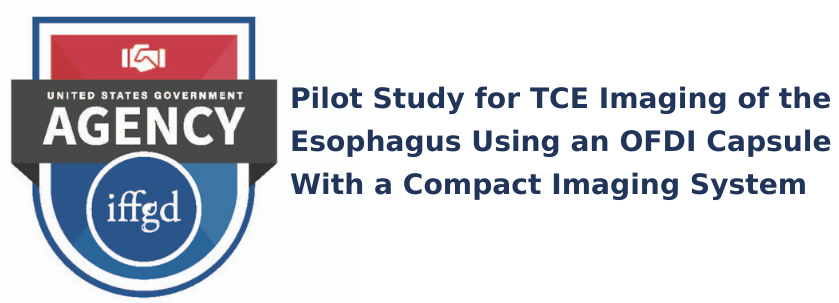
Purpose of study: The goal of this research is to determine the natural history of Barrett’s esophagus (BE) using tethered capsule endomicroscopy (TCE) in patients undergoing surveillance endoscopy.
Sponsor: Massachusetts General Hospital, National Institutes of Health (NIH) and National Cancer Institute (NCI)
Completion Date: 2025-12
Participation:
Patients with known BE without high grade dysplasia, intramucosal adenocarcinoma or esophageal adenocarcinoma, confirmed by endoscopic biopsy,
Patients over the age of 18
Patients who are capable of giving informed consent
Patients who had or will have a standard of care EGD within 9 to 15 months
Subjects must have no solid food for at least 4 hours prior to the procedure, and only clear liquids for 2 hours prior to the procedure.
Contact: Anna Gao, RN 617-643-6092 Tearneylabtrials@partners.org
Contact: Anita Chung, RN 617-724-4515 Tearneylabtrials@partners.org
| NCT02947971 |
C. Difficile Infection (CDI)
Added December 2023
Prevention of Recurrent Clostridium Difficile Infection (CDI) in Patients With Inflammatory Bowel Disease (IBD)
Purpose of study: The study will compare the effectiveness of Bezlotoxumab in individuals with active C. diff ( Clostridium difficile) infection who are diagnosed with Inflammatory Bowel Disease.
Sponsor: University of Pittsburgh
Start date: 2021-10-30
Completion date: 2025-12-30
Participation:
- >18 years old
- active CDI receiving therapy
- diagnosis of IBD
- and history of CDI.
Contact:
- Claudia Ramos Rivers, 412-648-7402, cmr95@pitt.edu
- David Binion, 412-383-0571, cmr95@pitt.edu
Gastroesophageal Reflux Disease (GERD)
Added July 2025
Purpose of the Trial: This is a two-site randomized clinical trial aiming to test whether a modified investigational bariatric surgical procedure can improve gastroesophageal reflux disease (GERD) after sleeve gastrectomy.
Sponsor: University of California, Irvine
Study Start Date: 2025-03-21
Completion Date: 2027-04-30
Participation:
Inclusion Criteria:
- Male and female subjects aged 18-60 years
- Body mass index (BMI) 35-50 kg/m2
- Must meet the BMI criteria before and after 6 months of nonsurgical weight management
Presence of GERD defined for this trial as acid exposure time (AET) of 4.9% or above as assessed with the Bravo pH test. - Have health insurance which pays for the costs of bariatric surgery and standard medical care before and after surgery
- Women of childbearing potential must be using appropriate contraception to avoid pregnancy throughout the study, and must have a negative pregnancy test at study entry and prior to surgery
- Must be able to provide written informed consent
Contact: Ninh T. Nguyen, MD, 714 456 8598, ninhn@hs.uci.edu
Added December 2023
Purpose of the study: This clinical feasibility study is to evaluate the performance of the Omega-Cuff in the treatment of acid reflux for up to 15 patients with a 1-year follow-up period. The Omega-shaped nitinol device is placed on top of the esophageal sphincter muscle just above the stomach in a laparoscopic surgical procedure without altering anatomy. In animal studies, the device safely increased the pressure on the sphincter, meaning it increased resistance to acid reflux, but did not interfere with normal food swallowing, meaning food went down to the stomach normally and smoothly. The device is intended to augment the function of the weak sphincter in minimizing acid reflux but allows easy swallowing of food in GERD patients. The clinical feasibility study is to see how well this device functions in patients and to assess its safety profile. This is a permanent implant that will last the lifetime of the patient. The device will not interfere with patients who may need diagnostic MRI scans. The device can be safely removed if needed.
Sponsor: Aplos Medical
Collaborators:
- National Institutes of Health (NIH)
- National Institute of Diabetes and Digestive and Kidney Diseases (NIDDK)
Start date: August 2023
Completion date: March 2025
Participation:
-
Subject must be at least 22 years of age and must be less than 75 years of age with a life expectancy > 3 years.
- Subject is a suitable surgical candidate, i.e., is able to undergo general anesthesia and laparoscopic surgery.
- Subject has documented typical symptoms of gastroesophageal reflux disease (GERD) for longer than 6 months (regurgitation or heartburn that is defined as a burning epigastric or substernal pain that responds to acid neutralization or suppression).
- Subject requires daily proton pump inhibitor or other anti-reflux drug therapy.
- Total Distal Ambulatory Esophageal pH must meet the following criteria: pH< 4 for ≥ 4.5% of the time Note: Subjects will have discontinued any GERD medications for at least 10 days prior to testing.
- Subject has a symptomatic improvement on proton-pump inhibitor (PPI) therapy demonstrated by a GERD-Health-Related Quality of Life (GERD-HRQL) score of ≤ 10 on proton-pump inhibitors and ≥ 15 off PPIs, or subjects with a ≥ 6-point improvement when comparing his/her on-PPI and off-PPI GERD-HRQL score.
- Subject has GERD symptoms in absence of PPI therapy (minimum 10 days).
- If the subject is of child-bearing potential, she must have a negative pregnancy test within one week prior to implant and must agree to use effective means of birth control during the course of the study.
- Subject is willing and able to cooperate with follow-up examinations.
- Subject has been informed of the study procedures and the treatment and has signed an informed consent form.
Contact: Claude Tihon, 1-952-944-3749, claude@aplosmed.com
Added September 2023
Purpose of study: This early phase I trial studies the guanylyl cyclase C (GCC) agonist effect on cGMP signal in duodenal tissue. Plecanatide and linaclotide are drugs approved by the Food and Drug Administration for the treatment of conditions related to constipation. This trial aims to see the effects of taking either one of two drugs, plecanatide or linaclotide, or no drug, on a certain chemical found in the tissue collected from small intestine and how they compare.
Sponsor: National Cancer Institute (NCI)
Start date: 2022-10-25
Completion date: 2025-02-01
Participation:
- Scheduled for clinically indicated esophagogastroduodenoscopy (EGD)
- Age >= 18 years of age. Note: Because no dosing or adverse event (AE) data are currently available on the use of plecanatide or linaclotide in participants < 18 years of age, children are excluded from this study but will be eligible for future pediatric trials, if applicable
- Willing to provide mandatory biospecimens as specified in the protocol
- Eastern Cooperative Oncology Group (ECOG) performance status =< 1
- Not pregnant or breastfeeding, as determined by clinical administration of pregnancy test prior to EGD procedure. Note: The effects of plecanatide and linaclotide on the developing human fetus at the recommended therapeutic dose are unknown. For this reason, women of childbearing potential and men must agree to use adequate contraception (hormonal or barrier method of birth control; abstinence) prior to study entry and for 2 weeks after discontinuing study agent. Should a woman become pregnant or suspect she is pregnant while participating in this study, she should inform her study physician immediately. Breastfeeding should be discontinued if the mother is treated with plecanatide or linaclotide
- Ability to understand and the willingness to sign a written informed consent document
Contact: Visit link below to find contact for your location
Minimally Invasive Surgery of the Gastro-esophageal Junction (MISGEJ)
Purpose of study: This study will assess short and long term outcomes of individuals undergoing minimally invasive surgery of the gastro-esophageal junction (MISGEJ). Patients will respond to questionnaires on an annual basis evaluating quality of life and functionality following MISGEJ. Hospital charts will also be reviewed on an annual basis to assess patient health outcomes.
Sponsor: Ottawa Hospital Research Institute
Start Date: 2011
Completion Date: 2027-11
Participation: All patients undergoing minimally invasive surgery of the gastro-esophageal junction at the Ottawa Hospital.
Contact: Andrew JE Seely, MD, PhDOttawa Hospital Research Institute https://clinicaltrials.gov/
Functional Heartburn
**Currently no active studies**
Rumination Syndrome
**Currently no active studies**
Gastroparesis
Added May 2025
Purpose of Trial: Exploring whether different Enterra® device programming methods used during sleep can sustain symptom relief and improve quality of life in patients with gastroparesis.
Sponsor: Enterra Medical, Inc.
Study Start Date: 2023-07-10
Study Completion Date: 2025-12
Participation:
Inclusion Criteria
- Completed informed consent process with signed and dated informed consent form;
- Stated willingness to comply with all study procedures and availability for the duration of the study;
- Male or female, aged ≥18 or ≤70 at time of informed consent;
- Currently implanted with the Enterra® Therapy System (Enterra® II 37800 neurostimulator);
- High GES output defined as remaining pulse generator expected life of > 9 months from enrollment and less than 4 years from the time of implant;
- Stable gastroparesis symptoms, in the opinion of the investigator;
- On stable medical therapy for gastroparesis symptoms;
- On stable supplemental nutritional support during the month prior to enrollment;
- English language comprehension to complete study-required assessments;
- Reliable access to internet-connected smart device(s) to complete study-required assessments.
Exclusion Criteria:
- Post-surgical gastroparesis (e.g., fundoplication, Bilroth I or II) or other active stomach or gastrointestinal diseases disorders which could explain symptoms in the opinion of the investigator;
- Subjects, in the opinion of the investigator, with profound nausea and/or vomiting at night;
- Subjects, in the opinion of the investigator, with profound gastroparesis symptoms upon waking in the morning;
- Subjects without a regular and defined sleep schedule;
- Pregnancy, or subject that intends to become pregnant during participation in the study;
- Chemical dependency;
- Enterra lead impedance measurements ≥ 700 Ohms at screening visit;
- Life expectancy < 1 year from conditions other than GI diseases;
- Subjects with an underlying disease leading to follow-up by MRI outside of current MR conditional indications;
- Participation in other clinical studies;
- Subjects involved in current or past medical-related litigation;
- Subjects with cognitive impairment or other characteristic that would limit subject’s ability to complete study requirements
Contact for Study: Timothy McAllister, clinicalresearch@enterramedical.com
Purpose of Trial: Assessing whether an enhanced Enterra® programming strategy can accelerate symptom improvement and enhance quality of life for patients with gastroparesis.
Sponsor: Enterra Medical, Inc.
Study Start Date: 2024-07-25
Study Completion Date: 2026-12
Participation:
Inclusion Criteria:
- Completed informed consent process with signed and dated informed consent form
- Stated willingness to comply with all study procedures and availability for the duration of the study
- Male or female, aged ≥18 or ≤70 years at time of Enterra® therapy implantation
- Diagnosed with idiopathic or diabetic gastroparesis
- Delayed solid-phase gastric emptying study (Eggbeaters™ test meal), completed within one year of patient enrollment in the study. Gastroparesis defined as > 60% retained at 2 hours and/or >10% retained at 4 hours
- Investigator confirms normal endoscopy within one year of enrollment in the study
- GCSI-DD score for nausea severity during the qualifying Baseline Period averaging 2.5 or more per week and vomiting averaging 5 or more episodes per week
Exclusion Criteria:
- Post-surgical gastroparesis (e.g., fundoplication, Billroth I or II) or other active stomach or gastrointestinal diseases disorders which could explain symptoms in the opinion of the investigator
- History of pyloroplasty or pyloromyotomy or G-POEM
- Pregnancy or breastfeeding at the time of consent, or intent to become pregnant during the study
- Active H. pylori infection
- Significant hepatic injury (elevated ALT, AST, bilirubin)
- Metabolic, mechanical, or mucosal inflammatory causes that may explain GI symptoms such as gallbladder disease, small bowel bacterial overgrowth, IBS, inflammatory bowel disease, celiac disease, liver or pancreatic disease, or bowel obstruction
- Patients with significant cardiac or cardiovascular disease, malignancy, or other conditions
- Participation in other clinical studies
- Use of narcotics more than three days per week or other drugs that may affect motility (e.g., Glucagon-like peptide 1 (GLP-1) agonist drug)
- Cannabis and/or cannabinoid use that exceeds either:
- Greater than 3 days of usage per week with 2 or less occurrences each day of use, or
- Greater than 3 grams of total usage per week
- Previous diagnosis or history of orthostatic intolerance, e.g., POTS, neurocardiogenic syncope, orthostatic hypotension
- Subject experiences discomfort during stimulation assessment that cannot be tolerated
- Subjects with an underlying disease leading to follow-up by MRI outside of current MR conditional indications
- Evidence of a failed response to temporary gastric electrical stimulation
Contact for Study: Timothy McAllister, clinicalresearch@enterramedical.com
Added April 2025
A Randomized, Double-Blind, Placebo-Controlled, Multicenter Study to Evaluate the Efficacy and Safety of CIN-102 (Deudomperidone) in Adult Subjects With Idiopathic Gastroparesis
Purpose of the study: To evaluate the safety and efficacy of CIN-102 (duedomperidone) to relieve symptoms of idiopathic gastroparesis.
Sponsor: CinDome Pharma, Inc.
Treatment or Intervention: CIN-102 (15 mg or 10 mg) or Placebo taken twice daily by mouth for 12 weeks
Start Date: FPFV January 2025
Completion Date: LPLV June/July 2026
Participation:
Inclusion Criteria:
- Age 18 or older
- Current diagnosis of gastroparesis
- Within the last 6 months, experienced gastrointestinal symptoms such as nausea or vomiting after eating, feeling too full after eating, bloating, and/or throat or stomach pain
- Able to adhere to eDiary completion throughout the study
- ***Additional inclusion criteria apply
Exclusion Criteria:
- Known primary cause of gastroparesis
- Current diagnosis of Type 1 or 2 diabetes
- Hospitalized for gastroparesis or malnutrition within 3 months prior to screening
- ***Additional exclusion criteria apply
Contact for study: Use link below to contact study clinics
Study link: https://www.gastroparesisstudy.com/
Purpose of Trial: To treat a single patient with gastroparesis who has requested expanded access with tradipitant
Sponsor: Vanda Pharmaceuticals, Inc.
Condition or Disease State: Gastroparesis; Diabetic gastroparesis
Study Start Date: 07/17/2020
Study Completion Date:
Participation:
Inclusion Criteria:
- Identified subject who requested expanded access
- Diagnosed with gastroparesis
- Demonstrated delayed gastric emptying
- Presence of moderate to severe nausea
- Patient does not qualify for or does not have access to other clinical trials with tradipitant
Exclusion Criteria:
- Another active disorder or treatment which could explain or contribute to symptoms of gastroparesis
- A positive test for drugs of abuse at the screening or evaluation visits
- Exposure to any investigational medication in the past 60 days other than tradipitant
- Gastrectomy, fundoplication, vagotomy, pyloroplasty, bariatric surgery, or gastric stimulation device surgically implanted within the last year
- Any other reason as determined by the Investigator which may lead to an unfavorable risk-benefit ratio to treatment
Contact for Study: clinicaltrials@vandapharma.com
Added April 2023
A Randomized, Double-Blind, Placebo-Controlled, Multicenter Study to Evaluate the Efficacy and Safety of CIN-102 (Deudomperidone) in Adult Subjects With Diabetic Gastroparesis
Purpose of Trial: A Randomized, Double-Blind, Placebo-Controlled, Multicenter Study to Evaluate the Efficacy and Safety of CIN-102 (Deudomperidone) in Adult Subjects With Diabetic Gastroparesis
Condition: Diabetic gastroparesis
Treatment or Intervention: Treatment
Sponsor: CinDome Pharma, Inc.
Start Date: March 31, 2023
Completion Date: September 2025
Participation:
- Is a male or female ≥18 years of age;
- Has a diagnosis of Type 1 or Type 2 diabetes, according to the American Diabetes Association criteria;
- Has a current diagnosis of diabetic gastroparesis defined by the following:
- Gastrointestinal symptoms felt to be consistent with gastroparesis within 6 months prior to Screening; AND
- Documented delayed gastric emptying within the past 2 years or willing to complete a gastric emptying breath test.
- Body mass index (BMI) between 18 and 45 kg/m2, inclusive;
- Glycosylated hemoglobin (HbA1c) level <10% at Screening;
- Willing to washout from ongoing treatment for gastroparesis.
Contact for Study: Rachael Farley R.Farley@Medpace.com, +1.513.579.9911, ext. 11961
Added August 2022
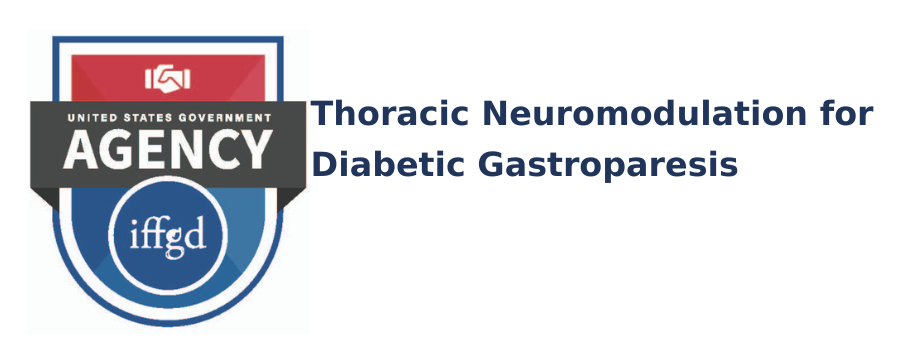
Purpose of Trial: To conduct a dose-ranging, sham-controlled trial () to assess the effect of Thoracic Spinal Nerve Magnetic Neuromodulation Therapy (ThorS-MagNT) on symptom severity and quality of life in diabetic gastroparesis.
Condition: Diabetic gastroparesis
Treatment or Intervention: Thoracic Spinal Nerve Magnetic Neuromodulation Therapy (ThorS-MagNT)
Sponsor: National Institute of Diabetes and Digestive and Kidney Disease
Study Start Date: July 1, 2022
Study Completion Date: June 30, 2025
Participation:
Inclusion Criteria:
- Outpatient diabetic gastroparesis patients with refractory symptoms and total ANMS GCSI score ≥ 2.0;
- Men or women age less than 85;
- No known mucosal disease;
- Speak, write, and understand English (by self-report);
- On stable doses of any medication for 30 days prior to entering the study and do not to change medications or dosages during the study period.
Exclusion Criteria:
- Postsurgical gastroparesis or prior gastric surgery (fundoplication, gastric resection or pyloroplasty);
- Gastrointestinal obstruction, Achalasia, Chronic Intestinal Pseudo-obstruction, Colonic Inertia;
- Use of opioids greater than 3 times a week and marijuana more than 5 times a week;
- Change in neuromodulator dosage in last 3 months (TCA, gabapentin, olanzapine, etc.) or use of sympathomimetics;
- Seizure history or disorder, Severe, unstable cardiac disease and arrythmias, Renal failure/dialysis;
- Metal implants that are not MR safe, gastric electrical stimulators (GES), deep brain stimulators (DBS), sacral nerve stimulators (SNS), or pacemakers;
- Pregnant women or nursing mothers;
Contact for Study:
Augusta University Contact info:
- Amol Sharma, MD, MS
Augusta University
Phone: 706-721-2239
Email: amosharma@augusta.edu
Massachusetts General Hospital Contact Info:
- Braden Kuo, MD, MS
Mass General Gastroenterology
Phone: 617-726-2426
Email: BKUO@mgh.harvard.edu
Added May 2022
GI Neuromuscular Pathology Prospective Registry
Purpose of Study: In this research study, biopsy samples will be collected to provide more insight into the underlying cause of the motility disorders, help direct further investigation into the cause of the underlying condition, provide future prognosis and predict response to gastric electrical stimulation (GES).
Sponsors: Indiana University
Start Date: December 2013
Competition date: December 2025
Participation: See the Clinical Trials site for all inclusion and exclusion criteria
- 6 Months to 90 Years (Child, Adult, Older Adult)
- Eligible for Study: All
- Accepts Healthy Volunteers: Yes
- Sampling Method: Non-Probability Sample
Contact:
- Contact: Travis Putzke 317-278-2064 tputzke@iu.edu
Contact: Kara Murphy 317-278-0406 clarkara@iu.edu
Added January 2022

Purpose of the Study: A randomized clinical trial comparing endoscopic per-oral pyloromyotomy (POP) versus a control sham intervention (diagnostic esophagogastroduodenoscopy (EGD) without pyloric disruption) in patients with medically refractory gastroparesis.
Sponsor: The Cleveland Clinic
Collaborators: National Institute of Diabetes and Digestive and Kidney Diseases (NIDDK)
Start Date: February 2022
Completion Date: July 2026
Participation: See study for all inclusion and exclusion criteria
- 18 to 65 years of age
- All sexes
- NOT accepting healthy volunteers
Contact:
- Denise Rose 216 445-4523 ROSED2@ccf.org
Added May 2021
Magnetic Resonance Imaging of the Brain and Stomach in Healthy Volunteers and Gastroparesis
Purpose of the Study: The study is to lay the groundwork for non invasive imaging of the GI tract and the brain gut interaction
Sponsor: Indiana University School of Medicine
Start date: 2/14/2020
Completion Date: 12/31/2025
Participation:
If Healthy Patient
- Healthy volunteers from 18 to 65 years of age
If Gastroparesis Patient:
- Patients with gastroparesis from 18 to 65 years of age.
- Symptoms of gastroparesis of at least 12 weeks duration with varying degrees of nausea, emesis, early satiety, effortless regurgitation, post-prandial fullness and pain, and/or postprandial epigastric pain.
- Abnormal 4-hour gastric emptying scintigraphy within the last 6 months >60% retention at 2 hrs and/or >10% retention at 4 hrs.
Contact:
- Anita Gupta, MBBS, MPH (317) 948-9227 or email at anigupta@iu.edu
- Fred Hermann (317) 278-9293 or email at fhermann@iu.edu
Added January 2019
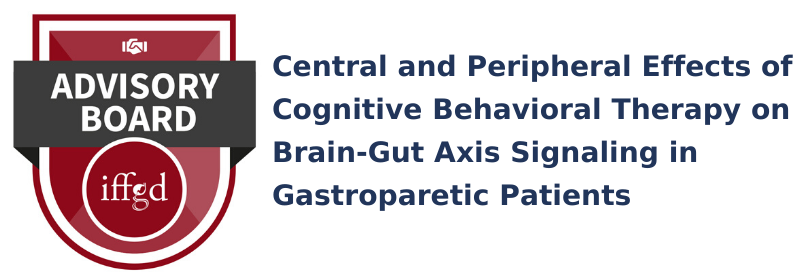
Purpose of study: This is a single-center, randomized pilot study to be conducted at Massachusetts General Hospital. The purpose of this study is to examine the non-pharmacological impact of Cognitive Behavioral Therapy (CBT) on gastroparesis symptoms and other clinical co-comorbidities such as pain, depression, anxiety, and catastrophizing. A subset of the CBT trial patients will undergo careful phenotyping pre- and post- intervention with brain MRI, autonomic function test (AFT), gastric emptying scintigraphy (GES), wireless motility capsule test (WMC), and nutrient drink test (NDT) to determine the impact of CBT on these metrics in patients with gastroparesis. Patients randomly assigned to a standard medical treatment (SMT) group will be treated by the standard of care. Characterization of these relationships or lack thereof can help guide future development of more targeted approaches and optimize treatment strategies for gastroparesis.
Sponsors: Massachusetts General Hospital
Completion Date: 2026-02-25
Participation:
Male and female patients aged 18 – 65 years old (inclusive)
Symptoms of gastroparesis of at least 12 weeks duration (do not have to be continuous) with varying degrees of nausea, vomiting, early satiety, and/or post-prandial fullness
An idiopathic etiology
GES of solids using 4 hours Egg Beaters® protocol within the last 6 months with either:
– Abnormal gastric emptying rate defined as an abnormal 2 hour (>60% retention) and/or 4 hour (>10% retention) result based on a 4 hour scintigraphic low fat Egg Beaters® gastric emptying study.
Body mass index (BMI) ≥ 17.5 kg/m2
Have not previously received CBT for coping with chronic illness
Have access to a computer with internet access
Speak, write, and understand English
On stable doses of any medication for 30 days prior to entering the study (exceptions are psychotropic, opioids, and/or illicit drugs) and agrees not to change medications or dosages during the study period.
Contacts: For more information, please visit: https://clinicaltrials.gov/
Contact: April Mendez 617-726-0196 amendez5@mgh.harvard.edu
Added April 2020
Purpose of study: To study an investigational drug to help symptoms for Diabetic Gastroparesis.
Sponsors: UNC Center for Esophageal Diseases and Swallowing.
Participation: Do you have Diabetic Gastroparesis? (i.e. : nausea, abdominal pain, post-prandial fullness, bloating, vomiting, and early satiety) If you are at least 18 years of age and currently suffering from symptoms of Diabetic Gastroparesis, you may be eligible for a research study involving an investigational drug to help reduce these symptoms. Study participation could last as long as 12-weeks. Compensation may be included for eligible participants.
Contacts: If you are interested in learning more about this study, please call (919) 843-0821 or email Ariel_Watts@med.unc.edu.
Added January 2019
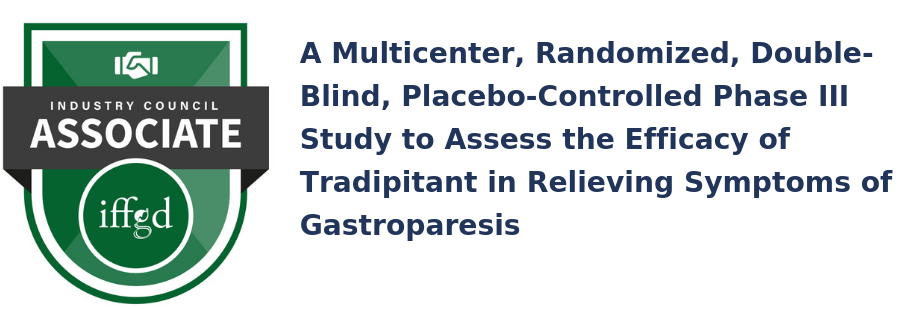
Purpose of study: To evaluate the efficacy of tradipitant relative to placebo in change from baseline to in nausea severity and other symptoms of gastroparesis.
Sponsors: Vanda Pharmaceuticals
Participation: Diagnosed with idiopathic or diabetic gastroparesis with moderate to severe nausea and delayed gastric emptying.
Contacts: Jesse Carlin Jesse.Carlin@vandapharma.com. For more information, please visit gpvandastudy.com
Added January 2020
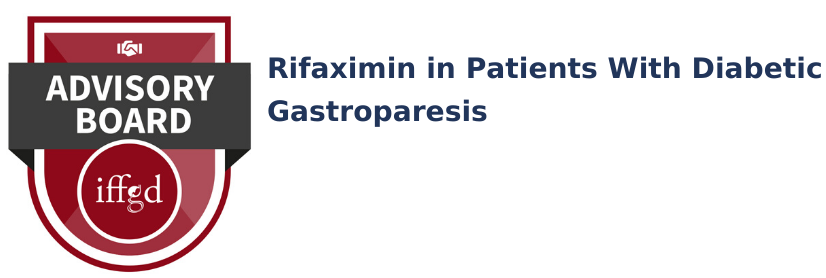
Purpose: Researchers are trying to determine if subjects with diabetic gastroparesis and symptoms of bloating will have a greater improvement in bloating symptoms when treated with rifaximin.
Sponsors: Mayo Clinic
Study Population: Men and women adult patients, aged 18-75, with diabetic gastroparesis
Diagnosis of diabetic gastroparesis will have been made previously using a combination of symptoms (e.g., nausea, vomiting, bloating, early satiety, abdominal pain), the absence of mechanical obstruction, and delayed gastric emptying using a 4-hour, solid phase scintigraphic study (GES; > 20% remaining at 4 hours)
Contact information: For more information, please visit https://clinicaltrials.gov/
Contact: Brian Lacy, MD 904-953-2000 lacy.brian@mayo.edu
Contact: Cangemi David, MD 904-953-2000 cangemi.david@mayo.edu
Rare Genetic Diseases
**No active Clinical Trials
Non-Alcoholic Fatty Liver Disease
Added March 2025
Purpose of the Study: The NAFLD Clinical Care Pathway (NCCP) intervention seeks to close this major gap in the care of Veterans by automatically identifying patients at risk of NAFLD, calculating their risk scores of having severe NAFLD, and educating the primary care providers on the diagnosis and treatment of NAFLD. This clinical trial will test the benefit of this NCCP intervention against usual care in increasing the rates of NAFLD diagnosis as well as referral to and enrollment in appropriate treatment. The study will also identify barriers and promotors of future NCCP implementation.
Sponsor: VA Office of Research and Development
Start date: 2024-02-02
Completion date: 2028-01-31
Participation:
-
Patient Aligned Care Teams (PACT) at the Michael E. DeBakey VA Medical Center
Study Contact:
-
Hashem B El-Serag, MD MPH, (713) 794-8640, Hashem.El-Serag@va.gov
-
Kyler Godwin, PhD MPH BS, (713) 440-4672, kyler.godwin@va.gov
Added June 2023

Purpose of study: In non-alcoholic fatty liver disease (NAFLD), fat accumulates in the liver and can cause damage. Researchers want to learn what causes the damage NAFLD, and to see if a medication can help.
Sponsor: National Institute of Diabetes and Digestive and Kidney Diseases (NIDDK)
Start date: July 24, 2019
Completion Date: August 1, 2024
Participation:
- Male or female Aged >= 18 years of age.
- Histological evidence of hepatic steatosis on a liver biopsy within 12 months OR evidence of fatty liver disease, as documented by imaging (ultrasound, CT, MRI, MRI-PDFF, MR spectroscopy, or Fibroscan CAP >= 285 db/M25) within 12 months.
- Estimated average alcohol consumption < 30 g/d for men or < 20 g/d for women in the 6 months prior to enrollment and no binge-drinking behavior.
- Ability of subject to understand and the willingness to sign a written informed consent document.
Contact: Yaron Rotman, M.D. (301) 451-6553 rotmanyaron@mail.nih.gov
Pediatric Gastrointestinal
Added July 2025
Long-term Qualitative and Quantitative Outcomes of Children With Hirschsprung’s Disease and Anorectal Malformations (ALOHA)
Purpose of study: Due to the variation in practice, there are limited data on long-term outcomes following surgery for children with HSCR or ARMs. Where studies have been performed, they often include small numbers, non-standardised outcome measures and short follow-up periods. It is therefore difficult to ascertain the effectiveness of different management strategies. However, a recent Delphi process has been carried out to establish 10 core measures in HSCR to improve outcome reporting. This research group has a long track record in this research area, specifically in the determination of long-term outcomes of children with HSCR, leading to well cited papers within the literature. In the last 2 decades there has been a significant change in the surgical techniques used in HSCR, however the underlying evidence base for this is still lacking. This study seeks to follow-on from previous studies looking specifically at the long-term outcomes in children with HSCR. Furthermore, the aim is to widen the study to encompass all children treated at Alder Hey and also to use the same methodology to assess long-term outcomes for children with ARMs, as both groups of patients experience similar long term morbidity.
Sponsor: Alder Hey Children’s NHS Foundation Trust
Start date: 2022-01-25
Completion date: 2028-08-01
Participation:
Inclusion Criteria:
- All children treated at either center with histologically confirmed Hirschsprung’s Disease since diagnosis from 1991
- All children diagnosed with anorectal malformation on the basis of position in relation to the external sphincter and size
Exclusion Criteria:
- Patients with non-histologically diagnosed Hirschsprung’s Disease
- Patients whose initial primary treatment or majority of follow-up for either condition has been external to either center
- Patients with funnel anus
- Adults who are unable to consent for themselves
Contact for study:
-
Sarah Almond sarah.almond@alderhey.nhs.uk
Added March 2025
Purpose of study: The objective of the Pediatric Gastroparesis Registry 2 is to create a national prospective registry of children, adolescents, and young adults with gastroparesis and gastroparesis-like syndrome (symptoms of gastroparesis but normal gastric emptying).
Sponsor: Johns Hopkins Bloomberg School of Public Health
Start date: 2024-12-18
Completion date: 2027-04-30
Participation:
- Provision of signed and dated informed consent form and assent, as age appropriate.
- Stated willingness to comply with all study procedures and availability for the duration of the study
- 8 to 25 years of age at the time of enrollment
- Symptoms of Gp of at least 12 weeks duration: constellation of some combination of:
- nausea, vomiting, early satiety, postprandial fullness; symptoms sometimes may be accompanied by upper abdominal pain
- Have undergone a gastric emptying scintigraphic study of solids using 4-hour Egg Beaters protocol (or equivalent generic liquid egg white meal) within the last 12 months who fall into one of the two categories:
- Delayed gastric emptying-defined as an abnormal 2-hour (>60% retention) and/or 4- hour (>10% retention) result based on a 4-hour scintigraphic gastric emptying study
- Gastric emptying that is not delayed but who have symptoms of Gp (designated in this study as GLS) or have previously participated in the Pediatric Gastroparesis Registry (PGpR) study
- An etiology of either diabetic or idiopathic Gp or GLS
Contact for study:
-
Laura Miriel, 410-955-4165, laura.miriel@jhu.edu
-
Peggy Adamo, 410-502-9137, madamo1@jhu.edu
Added June 2024
Purpose of Trial: There are no current, approved therapies to treat children 2 to 5 years of age with functional constipation (FC). Therefore, this study is designed to assess the safety and efficacy of an investigational drug in pediatric patients ages 2 to 5 years of age with functional constipation.
Sponsor: AbbVie
Study Start Date: December 22, 2022
Study Completion Date: November 14, 2025
Condition or Disease State: Pediatric Functional Constipation
Participation:
a. Are between 2 and 5 years and 11 months old.
b. Have a history of painful or hard bowel movements.
c. Meet additional study criteria.
Contact for Study:
If you are interested in this study for your child, please talk to your doctor and complete the online screener to see if your child qualifies for this study: https://pediatric-constipation-study.com/PAG/
To learn more about this study, please visit: https://www.clinicaltrials.gov/study/NCT05652205
Added January 2024
Purpose of Trial: Are you a parent with IBS? Consider joining the REACH Study! The purpose of this paid research study is to test whether an online program can help parents with irritable bowel syndrome (IBS) teach their young children to develop healthy habits.
Sponsor: Seattle Children’s Hospital, University of Washington
Condition: IBS
Start date: October 2023
Completion date: 2027
Participation:
Parents/caregivers meeting the following criteria may be a good fit for REACH:
- Have irritable bowel syndrome (IBS) or chronic unexplained abdominal pain
- Have children between 4 and 7 years of age in their household
- Able to speak, read and understand English
What will participants be asked to do?
- Complete online lessons for about 4 weeks (20-30 minutes per week)
- Complete 5 online surveys (45-60 minutes each), spread over a period of about 1.5 years
All study tasks done remotely. Study treatments are provided at no cost. Families will be compensated for their time (up to $325 total in Amazon gift cards).
Contact for study: Click here to fill out interest form! https://redcap.link/reach-kids
Application of Pharmacogenomics in Choosing Antidepressants for Children suffering from stress-induced IBS
Purpose of Trial: Graduate thesis
Condition: Stress induced IBS
Start date: Jan 9th, 2024
Completion Date: March 4th, 2024
Contact for Study: Tripta Rughwani
IRB File # EXP452781
Link to survey: Take survey here
Added December 2023
Purpose of study: The goal of this investigator-initiated, single-center, randomized controlled trial (RCT) is to compare the effects of four weeks of three therapies on clinical and mechanistic outcomes based on pH-Imp testing using a three-arm parallel design in NICU infants with objective GERD diagnosis. The three therapies being compared are natural maturation, proton pump inhibitor (PPI) use, and added rice (AR) formula use.
Sponsor: Nationwide Children’s Hospital
Collaborators:
- National Institute of Diabetes and Digestive and Kidney Diseases (NIDDK)
Start date: November 2023
Completion date: November 2027
Participation:
-
NICU infants of any gestational age who are between 37 – 47 weeks postmenstrual age at inception of the study meeting the following requirements:
- GERD diagnosis using pH-impedance criteria (Acid Reflux Index ≥ 3% plus at least one of the following: # GER events >70 / day, Symptom Associated Probability ≥ 95%, Discal Baseline Impedance < 900 Ω)
- Full enteral feeds
- No current GERD therapies
Contact:
- Erika K Osborn, 614-355-6667, erika.osborn@nationwidechildrens.org
- Patty Luzader, 614-355-6667, patty.luzader@nationwidechildrens.org
Added November 2023
Purpose of Trial: To assess the Safety and Efficacy of Tenapanor for the Treatment of IBS-C in adolescents.
Condition: IBS-C
Treatment or Intervention: Tenapanor 25 mg bid, or 50 mg bid or placebo
Phase of Trial: 3
Sponsor: Ardelyx, Inc
Study Start Date: November 2022
Study Completion Date: Aug 2024 (end of enrollment)
Participation:
Inclusion Criteria:
- ≥12 and <18 years old
- Patient weighs ≥18 kg at the time the patient provides written assent
- Females of child-bearing potential must have negative pregnancy test at Visit 1 (serum) and Visit 2 (urine) and confirm the use of appropriate contraception (including abstinence).
- Patient meets the Rome IV criteria for child/adolescent diagnosis of IBS-C
- Patient is willing to discontinue any laxatives used in favor of the protocol-permitted rescue medicine (which will only be allowed after 72 hours with no bowel movement)
- Patient meets the entry criteria assessed during the 2-week Screening period.
- Ability of both the patient and parent/guardian/LAR to communicate with the Investigator and to comply with the requirements of the entire study, including an understanding of the assessments in the eDiary and how to use the eDiary device
- Patient must provide written assent and the parent/guardian/LAR must provide written informed consent before the initiation of any study-specific procedures
Exclusion Criteria:
- Functional diarrhea as defined by Rome IV child/adolescent criteria
- IBS with diarrhea (IBS-D), mixed IBS (IBS-M), or unsubtyped IBS as defined by Rome IV child/adolescent criteria
- History of non-retentive fecal incontinence.
- Required manual disimpaction any time prior to randomization (after consent);
- Has both unexplained and clinically significant alarm symptoms (lower gastrointestinal [GI] bleeding [rectal bleeding or heme-positive stool], iron-deficiency anemia, or any unexplained anemia, or weight loss) and systemic signs of infection or colitis, or any neoplastic process
- Patient has any of the following conditions:
- Celiac disease, or positive serological test for celiac disease
- Cystic fibrosis
- Hypothyroidism that is untreated or treated with thyroid hormone
- Down’s syndrome or any other chromosomal disorder
- Active anal fissure
- Anatomic malformations (eg, imperforate anus)
- Intestinal nerve or muscle disorders (eg, Hirschprung disease)
- Neuropathic conditions (eg, spinal cord abnormalities)
- Lead toxicity, hypercalcemia
- Neurodevelopmental disabilities producing a cognitive delay that precludes comprehension and completion of the daily eDiary (Electronic handheld device)
- Inflammatory bowel disease
- Childhood functional abdominal pain syndrome
- Childhood functional abdominal pain;
- Poorly treated or poorly controlled psychiatric disorders that might influence his or her ability to participate in the study;
- Lactose intolerance that is associated with abdominal pain or discomfort
- History of cancer other than treated basal cell carcinoma of the skin; (Note: Patients with a history of cancer are allowed provided that the malignancy has been in a complete remission for at least 5 years before the Randomization Visit.)
- History of diabetic neuropathy.
- Use of medications that are known to affect stool consistency (Prohibited Medications), including fiber supplements, anti-diarrheals, cathartics, antacids, opiates, prokinetic drugs, laxatives, enemas, antibiotics during the Screening period; unless specified as rescue medication, and used accordingly as directed by the Investigator.
- Patient has had surgery that meets any of the following criteria:
- Bariatric surgery for treatment of obesity, or surgery to remove a segment of the GI tract at any time before the Screening Visit;
- Surgery of the abdomen, pelvis, or retroperitoneal structures during the 6 months before the Screening Visit;
- An appendectomy or cholecystectomy during the 60 days before the Screening Visit;
- Other major surgery during the 30 days before the Screening Visit
- History of alcohol or substance abuse
- Participation in other clinical trials within 1 month prior to Screening
- Patient and/or parent/guardian/LAR is involved in the conduct and/or administration of this trial as an investigator, sub-investigator, trial coordinator, or other staff member, or the patient is a first-degree family member, significant other, or relative residing with one of the above persons involved in the trial
- If, in the opinion of the Investigator, the patient is unable or unwilling to fulfill the requirements of the protocol or has a condition, which would render the results uninterpretable
Contact for Study: jtabora@ardelyx.com
Purpose of Trial: Irritable Bowel Syndrome with diarrhea (IBS-D) is a digestive disorder that can cause abdominal pain, bloating, gas, frequent loose stools or a combination of the above. IBS-D occurs in people of all ages, including children.
This study is being conducted to evaluate the safety and efficacy of an investigational medication, eluxadoline, for treating pediatric patients with IBS-D, ages 6-11 years old.
Condition: IBS-D
Treatment or Intervention: Eluxadoline
Phase of Trial: II
Type of Study: Dose selection study
Sponsor: Abbvie, Inc
Inclusion Criteria: Your child may qualify if they:
- Are 6 to 11 years of age
- Have frequent episodes of diarrhea
- Are in generally good health
- Meet additional study criteria
Study Start Date: November 2017
Study Completion Date: 2026-12
Contact for Study:
- Interested participants: https://pediatric-ibsd.researchstudytrial.com/
- healthcare providers: https://peds-ibsd-hcp.researchstudytrial.com/
ABBVIE CALL CENTER 844-663-3742 abbvieclinicaltrials@abbvie.com
Body Surface Gastric Mapping (BSGM) to Evaluate Patients With Gastrointestinal (GI) Symptoms
Purpose of Trial: The goal of this observational study is to learn about gastric myoelectric activity in children with GI symptoms. The main question it aims to answer is which patterns or signals are associated with GI symptoms as measured by a body surface gastric mapping (BSGM) device. Participants will have their stomach activity recorded for up to 4 hours using the BSGM device and log real-time symptoms. Researchers will compare the recordings of healthy children and children with GI symptoms to define abnormal GI patterns.
Sponsor: Children’s Hospital of Philadelphia
Conditions: Functional GI Disorders, Gastrointestinal motility disorders, Dyspepsia and other specified disorders of function of stomach, gastroparesis
Start Date: 10-1-2021
Completion date: 12-31-2024
Inclusion Criteria:
- Male or female age 8-25 years
- Confirmed diagnosis of a functional gastrointestinal and/or motility disorder by Rome IV criteria
- Body mass index of < 35
- Females ≥11 years of age or who have reached menarche must have a negative urine pregnancy test and must use an acceptable method of contraception for the duration of the study
- Parental/guardian permission (informed consent) and if appropriate, child assent
Contact: Children’s Hospital of Philadelphia, Hayat Mousa MD, MousaH@chop.edu
Added September 2023
Feasibility, Safety, and Potential Efficacy of Fecal Microbiota Transplantation (FMT) for Gastrointestinal Dysfunction in Children Following Hematopoietic Cell Transplant (HCT)
Purpose of study: Participants will be eligible to receive an FMT on or after Day +30 post-HCT. FMT will be performed using FMP material obtained from OpenBiome. 60 mL of FMP will be administered via NJ tube and 250 mL via colonoscopy. A second FMT may be performed at least 14 days after the initial FMT in GI clinical symptoms have partially improved or have not changed. The second FMT will be administered using the same procedure as in the initial FMT
Sponsor: St. Jude Children’s Research Hospital
Start date: September 2023
Completion date: December 2024
Participation:
- Age < 22 years old.
- Received an allogeneic HCT greater than or equal to 30 days prior to enrollment
-
Diagnosed with one of the following conditions:
- Steroid-resistant gut a GvHD (defined as GI symptoms that do not improve within 5 days after initial steroid therapy, >/= 1mg/kg of prednisolone) OR
-
Steroid-dependent gut a GvHD (defined as the presence of a response to methylprednisolone 2 mg/kg/day but relapsing when an attempt was made to taper steroid treatment).
OR
-
Current or prolonged GI dysfunction following HCT, defined as having diarrhea or loose stools >/= 4 weeks with at least one of the following:
- Requiring NG or G-tube feeds
- Requiring TPN or IVF for more than 4 weeks
- Diagnosis of gastroparesis by GI specialist documented in the medical record
- Willing and able to provide informed assent/consent
Contact: Gabriela Maron, MD 866-278-5833, referrainfo@stjude.org
Added July 2023
Study to Assess the Efficacy and Safety of NEXIUM for Maintenance of Healing of Erosive Esophagus(EE)
Purpose of Study: Esomeprazole (NEXIUM™) is indicated for the maintenance of healing of endoscopy-verified erosive esophagitis (EE) in children 1 to 11 years of age in a number of countries worldwide, but not in the United States (US). The current study has been designed, in discussions with the Food and Drug Administration (FDA), to further evaluate the safety and efficacy of NEXIUM given as maintenance of healing of EE in children 1 to 11 years of age
Sponsor: AstraZeneca
Start Date: July 2022
Completion Date: August 2026
Participation:
- Patient must be 1 to 11 years of age
- Patients must have a history of GERD for at least 3 months before the start of study
- For the healing phase: Patients must have confirmed presence of EE at endoscopy performed within one week of the start of the healing phase.
- For the maintenance phase: Patients must have completed the healing phase and have endoscopy-verified healed EE at the 8-week endoscopy visit.
- Patients must weigh ≥ 10 kg.
- Patients may be male or female.
- All postmenarcheal female patients must have a negative pregnancy test (urine) before starting treatment.
- Sexually active patients must be abstinent or maintain effective contraception from informed consent day up to the last day of IMP treatment.
- Patient’s guardian must be capable of giving signed informed consent
Contact: AstraZeneca Clinical Study Information Center, 1-877-240-9479, information.center@astrazeneca.com
Added November 2022

Purpose of Trial: The purpose of this study is to determine the safety, efficacy, and pharmacokinetics (PK) of etrasimod for the treatment of moderately to severely active ulcerative colitis in adolescents (≥ 12 years up to < 18 years of age). Participants who will complete the total 52-week treatment period will have the opportunity to continue in a Long-Term Extension (LTE) Period of up to 4 years (5 years after study enrollment), or until marketing authorization is obtained in the participant’s country, whichever comes first.
Condition: Ulcerative Colitis
Sponsor: Arena Pharmaceuticals
Start Date: November 2022
Completion Date: January 2025
Participation:
- 12-17 years old
Inclusion criteria:
- Have a diagnosis of ulcerative colitis (UC) that is moderately to severely active
- Participants are permitted to be receiving a therapeutic dose of select UC therapies
Exclusion criteria:
- Severe extensive colitis
- Diagnosis of Crohn’s disease (CD) or indeterminate colitis or the presence or history of a fistula consistent with CD
- Diagnosis of microscopic colitis, ischemic colitis, or infectious colitis
Contact: Arena CT.gov Administrator +1 855-218-9153 ct.gov@arenapharm.com

Purpose of Trial: The purpose of this study is to explore the outcomes, tolerability and safety of 2 different doses of oral pantoprazole (full healing dose, half healing dose), assigned based upon weight, for the maintenance of healing of erosive esophagitis in pediatric participants aged 1 to 17 years with endoscopically-confirmed, healed erosive esophagitis.
Condition: Esophagitis
Sponsor: Pfizer Pharmaceuticals
Start Date: January 2022
Completion Date: December 9, 2027
Participation:
- 1-17 years old
Inclusion Criteria:
- Participants must have a documented erosive lesion with an Los Angeles (LA) Grade of A to D prior to starting Proton Pump Inhibitor treatment:
- Capable of giving signed informed consent/assent
- Willingness and ability of the participant or parent/legal guardian to complete the eDiary
- Willing and able to comply with all scheduled visits, treatment plan, laboratory tests, lifestyle considerations, and other study procedures, including the use of the eDiary.
- Male and female participants aged 1 to 17 years.
- Minimum body weight 7 kilogram and weight at least at the 5th percentile per the Center for Disease Control standard age and weight chart, for the participant’s age.
- To be considered a female of non childbearing potential, the participant must meet at least 1 of the following criteria :
- Premenarchal: The investigator (or other appropriate staff) must discuss the participant’s premenarchal status with the participant and parent/legal guardian at office visits and during telephone contacts, as participants who achieve menarche during the study would no longer be considered “female participants of non childbearing potential” and must comply with the protocol requirements applicable to women of childbearing potential.
Contact: Pfizer CT.gov Call Center 1-800-718-1021 ClinicalTrials.gov_Inquiries@pfizer.com
Celiac Disease
Added December 2024
Purpose of Trial:The main aim of the study is to assess if TAK-101 can reduce gluten related symptoms and immune activation in adult participants with celiac disease (CeD) on a gluten-free diet (GFD).
Sponsor:Takeda
Study Start Date: 2022-06-23
Study Completion Date: 2025-10-30
Participation:
- Inclusion Criteria:
- Male or Female ages 18-75 years old
- Biopsy-confirmed CeD that is well-controlled, defined as mild or with no ongoing signs or symptoms felt to be related to active CeD and with immunoglobulin A (IgA) tissue transglutaminase (tTG) <2 × upper limit of normal (ULN) and IgG deamidated gliadin peptide (DGP) <3 × ULN.
- Must be able to maintain a gluten-free diet (GFD) for ≥6 months.
- Must be HLA-DQ2.5 and/or HLA-DQ8 positive during screening laboratory testing.
- Exclusion Criteria:
- Has received any investigational compound within 12 weeks (84 days) or 5 half-lives, whichever is longer, before signing of the informed consent form (ICF).
- Has received TAK-101 in a previous clinical study.
- Has presence of other inflammatory gastrointestinal (GI) disorders or systemic autoimmune diseases, that either have the potential to cause persistent GI symptoms similar to CeD or are not well controlled without the use of excluded medications.
- Has known or suspected refractory CeD or ulcerative jejunitis.
- Has known or suspected allergy to wheat, such as hypersensitivity and/or anaphylaxis including wheat-dependent-exercise induced anaphylaxis (WDEIA). If there is a possible history of urticaria, angioedema, or anaphylaxis to wheat, investigators should perform testing for wheat anti-Immunoglobulin (anti-IgE) antibodies or refer to an allergist for evaluation prior to enrollment to rule out any of these allergies.
- Ongoing systemic immunosuppressant, systemic (oral or IV) corticosteroid treatment, or has received treatment with systemic immunosuppressants or corticosteroids in the 12 weeks before run-in gluten challenge.
- Has known or suspected clinically significant liver disease or positive test result for hepatitis B or C.
- Has intolerable symptoms after the run-in gluten challenge and is unwilling to undergo subsequent post treatment gluten challenges.
- Has known allergy to or intolerance of TAK-101 or any of its ingredients or excipients. Also, any subject with a symptomatic allergic reaction that is confirmed by laboratory serology such as elevated tryptase levels following the administration of TAK-101 will be excluded from future dosing.
- Has a current diagnosis of active malignancy or malignancy diagnosed in the 5 years prior to screening or is receiving ongoing treatment for malignancy.
Contact for Study: +1-877-825-3327, medinfoUS@takeda.com
Link to study: www.illuminatecd.com
Added February 2023

Purpose of study: A clinical trial to evaluate ZED1227 in comparison with placebo in subjects with celiac disease experiencing symptoms despite gluten-free diet
Sponsor: Dr. Falk Pharma GmbH
Phase of Trial: Phase IIB
Completion date: Ongoing
Participation:
Inclusion:
- Documented diagnosis of celiac disease proven by biopsy at least 12 months prior to screening
- Adherence to a gluten-free diet (GFD) for at least 12 months prior to screening
- Human leukocyte antigen DQ (HLA-DQ, a type of genetic testing) typing compatible with celiac disease
- At least one moderate or severe gastrointestinal symptom (i.e., diarrhoea, abdominal pain, bloating or nausea) during the last 4 weeks prior to first study visit
- Negative diagnosis of Helicobacter pylori (H pylori) infection
Exclusion:
- Selective immunoglobulin A deficiency
- Diagnosis of confirmed refractory celiac disease type I or II (exception: RCD I can be considered for inclusion if there is no clear sign of T cell monoclonality or atypical T cells)
- Severe complications of celiac disease
- Any concomitant diseases of the intestinal tract in addition to celiac disease
- Evidence of relevant systemic disease
EudraCT Number: 2020-004612-97
Study website: Contact for study
Chronic Intestinal Pseudo-Obstruction
Added February 2024
Pseudo-Obstruction Assessment With MRI (POM)
Purpose of study: This study will explore the potential for a standardized MRI scan after a liquid meal to be used in diagnosis of the rare but debilitating chronic intestinal pseudo-obstruction (CIPO).
Sponsor: University of Nottingham
Start date: 1/17/2020
Completion date: 12/20/2024
Participation:
- 16 years or older
- Ability to give informed consent
- Sufficient level of English language to understand study information and respond to symptom questionnaires
- CASES: a clinical diagnosis of primary or secondary Chronic Intestinal Pseudo-Obstruction, excluding adhesional obstruction. PICs will be asked to send clinical documentation that the diagnosis has been confirmed on crosssectional imaging.
- CONTROLS: a Chronic constipation disorder diagnosed according to Rome IV criteria for functional constipation, constipation-predominant irritable bowel syndrome or opioid-induced constipation (diagnostic criteria as listed in Lacy et al 2016)
Contact for study:
-
Giles Major, PhD, +44 115 8231035,
-
giles.major@nottingham.ac.uk
Irritable Bowel Syndrome (IBS)
Added May 2025
Purpose of the trial: The purpose of this study is to learn more about how to improve treatment of patients with diarrhea predominant Irritable Bowel Syndrome (IBS-D) symptoms.Included patients will be requested to answer online surveys and will undergo treatment with rifaximin. Hydrogen breath testing and biologic samples collection will also be completed during the study.
Sponsor: University of Michigan
Study Start Date: 2020-01-09
Study Completion Date: 2026-01-01
Participation:
Inclusion Criteria:
- IBS-D (Rome IV Diagnostic Criteria)
- Diary compliance for at least 5 days and no rescue medications during baseline
- Appropriate levels of abdominal pain and diarrhea
Exclusion Criteria:
- Pregnant women or planning on becoming pregnant while in the study, or lactating women while in the study
- Inflammatory bowel disease, diabetes mellitus, systemic sclerosis, or celiac disease
- Active gastrointestinal or hematological malignancy which requires ongoing treatment
- Surgery to the GI tract in the past 3 months
- Gastrointestinal infection or diverticulitis in the past 3 months
- Severe hepatic impairment
- Any use of antibiotics in the past month
- Current use of probiotics
- Any history of allergies to rifaximin or its derivatives
- Any comitant use of P-glycoprotein inhibitors (for example. Cyclosporine)
- Known allergies to glucose or lactulose
Contact for Study: Borko Nojkov, MD, 734-936-9455, bnojkov@med.umich.edu
Exclude or Expose in Irritable Bowel Syndrome: What Works for Whom and How?
Purpose of Trial: To investigate and compare the effects of internet-delivered FODMAP diet and exposure-based cognitive behavioral therapy (CBT) on gastrointestinal symptoms in adults with IBS. The study aims to identify which treatment works best for different subgroups, and to understand mediators and moderators of treatment response.
Sponsor: University of Melbourne (Funded by the Rome Foundation and the Australian NHMRC)
Study Start Date: May 2025
Study Completion Date: 2027 anticipated
Participation:
Inclusion Criteria:
- Adults aged ≥18 years
- Residing in Australia or USA
- Self-reported diagnosis of IBS meeting Rome IV criteria
- Current IBS Symptom Severity Score (IBS-SSS) ≥175
- Access to internet/computer
- Able to provide informed consent
Exclusion Criteria:
- Diagnosed with other gastrointestinal diseases
- Recent major GI surgery
- Uninvestigated alarm symptoms (e.g. blood in stool)
- Current or history of eating disorder, psychotic, substance use, or bipolar disorder
- BMI ≤18.5 or ≥34.9 kg/m²
- Pregnant or lactating
- Currently following or recently (within 3 months) completed dietitian-led dietary restriction for IBS (e.g. FODMAP diet)
- Currently receiving or recently (within 3 months) completed behavioural therapy for IBS
- Commencement or change in dose of pro-/prebiotics, fibre supplements, digestive enzymes, antibiotics, medications affecting GI transit, or psychotropic medication within 3 months prior to study
- Unwilling to change diet or participate in behavioural intervention
- Insufficient English language or computer skills
Contact for Study: gut-research@unimelb.edu.au
Link to study
• Participant info and sign-up: https://redcap.link/IBSstudy
Added September 2024
Purpose of Trial: The purpose of this research is to research the relationship between menstruation and gastrointestinal symptoms. We will be using a free smartphone app, called Clue Period Tracker & Calendar in our study. We will be recruiting healthy controls, and patients diagnosed with Irritable Bowel syndrome (IBS), and chronic idiopathic constipation (CIC). The study will assess the use of used a menstrual cycle app in order to track menstrual cycle phases in IBS and CIC, and its link with symptom severity.
Condition or Disease State: Irritable Bowel Syndrome, Chronic Idiopathic Constipation
Study Start Date: 10/16/2023
Study Completion Date: N/A
Participation:
Inclusion Criteria:
- Premenopausal females with IBS, CIC, or healthy controls, aged 18 to 40 years of age, regular menses, have not had pregnancy or childbirth within the previous 12 months. All subjects must have access to a smartphone.
- Premenopausal females with IBS: The diagnosis of IBS and bowel habit subtypes (IBS with diarrhea [IBS-D], IBS with constipation [IBS-C], IBS with mixed bowel habits [IBS-M]) will be based on the ROME IV diagnostic criteria for IBS and no evidence of organic GI disease.
- Premenopausal females with CIC: The diagnosis of CIC will be based on the ROME IV criteria for CIC, and no evidence of organic GI disease.
- Premenopausal female healthy controls: No current or past history of chronic GI or pain disorders. All subjects must have access to a smartphone.
Exclusion Criteria:
- Females who have had a bilateral oophorectomy and/or hysterectomy, use of oral contraceptive agents (OCP) or hormone replacement therapy (HRT), current pregnancy, childbirth within the past 12 months, history of active psychiatric illness.
Contact for Study: Regan Cortessis (rcortessis@mednet.ucla.edu)
Purpose of Trial: The purpose of this research is to study sex differences in Irritable Bowel Syndrome (IBS) related to the brain and gut microbiome, and the impact of a 12-week modified cognitive behavioral therapy (CBT) on the brain and gut bacteria health.
Sponsor: NIH
Condition or Disease State: Irritable Bowel Syndrome, Chronic Idiopathic Constipation
Study Start Date: 06/29/2020
Study Completion Date: N/A
Treatment or Intervention: 12-week Cognitive Behavioral Therapy program using Mahana Research App
Participation:
Inclusion Criteria:
- Premenopausal females and males with IBS symptoms, aged 18 to 50 years of age, have not had pregnancy or childbirth within the previous 12 months, not currently being treated by GI specific CBT. All subjects must have access to a smartphone.
- The diagnosis of IBS and bowel habit subtypes (IBS with diarrhea [IBS-D], IBS with constipation [IBS-C], IBS with mixed bowel habits [IBS-M]) will be based on the ROME IV diagnostic criteria for IBS and no evidence of organic GI disease.
Exclusion Criteria:
- hormone replacement therapy (HRT), current pregnancy, childbirth within the past 12 months, history of active psychiatric illness, any major chronic diagnosis (cancer, diabetes, IBD, celiac disease etc)
Contact for Study: Juliana Reist (jreist@mednet.ucla.edu)
Added May 2024
Phase 2, Randomized, Double-Blind, Placebo-Controlled, Multicenter, Parallel-Group Study to Evaluate the Efficacy, Safety, and Tolerability of CIN-103 in Adults with Irritable Bowel Syndrome With Predominant Diarrhea (IBS-D)
Purpose of Trial: To evaluate if the study drug can help reduce the symptoms associated with irritable bowel syndrome with predominant diarrhea (IBS-D) in adult patients
Sponsor: CinPhloro Pharma, LLC
Condition: IBS-D
Start date: December 28, 2023
Completion date: December 11, 2024
Participation:
Key Inclusion Criteria:
- Are adult male and female subjects ≥18 years of age
- Have a body mass index between 18 and 40 kg/m2, inclusive at screening
- Meet Rome IV Criteria for IBS-D by subject self-report of recurrent abdominal pain that is associated with ≥2 of the following over the last ≥6 months, with frequency of at least 1 day per week over the last 3 months (on average) before enrollment
Key Exclusion Criteria:
- Have a diagnosis or suspected diagnosis of non-diarrhea predominant IBS (eg, IBS with a subtype of constipation, IBS with mixed or alternating bowel habits, un-subtyped IBS) or functional constipation by the Rome IV Criteria;
- Have a history of or current inflammatory bowel disease
- Have a known family history of inflammatory bowel disease in at least 1 first-degree relative
Contact: www.envivastudy.com
Stress and Health-Related Quality of Life Among Adults with IBS
Purpose of the Study: To research the effects of stress, pain, thinking, interpersonal relationships, and quality of life. The researcher specifically wants to learn the relationship with the levels of stress when performing tasks at home or at work, pain, anxiety, interpersonal relationships, and the overall quality of life with symptoms of irritable bowel syndrome (IBS)
Participation:
- English-speaking adults between the ages of 18 to 65 years old and suffer from irritable bowel syndrome (IBS)
Research conducted by: Aida Benitez-Rexach, Master of Philosophy in Psychology student at Walden University and doctoral student, under the supervision of Dr. M. Hanania and Dr. D. Heretick of Walden University.
To participate: Please fill out this survey
05-19-21-035615
Added May 2018
Participants Sought for Study on Complementary Approaches to the Treatment of IBS
Purpose of study: The purpose of this study is to find a complementary treatment to help Irritable Bowel Syndrome (IBS) patients in need of relief.
About The Study: The length of this study will be three weeks long, with a short online intervention everyday to help individuals deal with their body’s reactions to their environments. Participants will have additional surveys to assess their overall state at the beginning of the study, at the end of the three week intervention, and again at six weeks for a follow-up.
Participation: Eligible individuals between the ages of 18 – 65 years of age who are experiencing pain or discomfort associated with their gut. Cannot be smokers or have an inflammatory bowel disease.
How to Sign Up:http://bit.ly/IBS_study
There will be a $15 Target gift card for first 30 participants upon completion of study.
Study Contact: Jenna N. Ray, Health Psychologist. Phone: (919) 257 – 7291, Email: jray51@uncc.edu
Congenital Sucrase-Isomaltase Deficiency (CSID)
Evaluation of a 7-Day Therapeutic Trial Dose of Commercial Sucraid®(sacrosidase) Oral Solution for Alleviating Congenital Sucrase-Isomaltase Deficiency (CSID) Symptoms in Pediatric Subjects with Low, Moderate, and Normal Sucrase Levels
Purpose of Trial: To investigate the effects of Sucraid® treatment on gastrointestinal symptoms in subjects with low, moderate, and normal disaccharidase assay sucrase levels from an esophagogastroduodenoscopy (EGD).
Treatment or Intervention: Commercial Sucraid®
Sponsor: QOL Medical
Study Start Date: May 2022
Study Completion Date: March 2024
Participation:
Inclusion Criteria:
1. Subjects with documented disaccharidase assay levels of lactase, sucrase, maltase, and palatinase via EGD disaccharidase assay (DA) performed no more than 1 year prior to enrollment with normal histological interpretation. Eligible subjects will be enrolled into the following study groups based on their documented sucrase level.
- DA Sucrase <25 µM/min/gram protein (N=500)
- DA Sucrase 25-35 µM/min/gram protein (N=500)
- DA Sucrase >55 µM/min/gram protein (N=100)
2. At the discretion of the investigator, subject is suspected of CSID and has at least one symptom of diarrhea, abdominal pain, gas/bloating, nausea, or borborygmi at least 3X per week for the past 3 months or more.
3. Subject or parent/guardian must provide informed consent/assent prior to any study procedures being performed.
4. Subject is a U.S. resident.
5. Subject is male or female; ages 6 months to 17 years old at the time of screening.
6. Subject/parent or guardian is willing and able to complete necessary study procedures including following study instructions, completing electronic questionnaires via a personal mobile device, attending study visits and, in the Investigator’s judgement is sufficiently able to participate in the study.
7. Subject/parent or guardian must be able to reach or understand the English language.
8. Subject or parent/guardian must have their own Android or Apple device for Bring Your Own Device patient mobile app (BYOD).
Contact for Study: Nathalie Chan Director, Patient Recruitment Services Nchan@totalcro.com
Inflammatory Bowel Disease (IBD)
Added May 2023

Purpose of Study: The purpose of this study is to collect clinical data and samples (including blood, breath and stool) donated by patients with IBD and patients with no IBD (controls) to facilitate research that may result in the development of new non-invasive methods of diagnosing IBD and understand the progression of the disease over time in order to better manage IBD patients.
Sponsor: AbbVie
Start Date: March 22, 2021
Completion Date: April 30, 2024
Participation:
Inclusion Criteria:
- Diagnosed as having Crohn’s Disease or Ulcerative Colitis
- Aged 18-70 years.
- Understands the language and signs an informed consent form.
- Any disease location, except isolated upper GI Crohn’s disease only
- Any CD or UC disease activity.
- Outpatients and inpatients
- Patients will be recruited, and samples obtained at least one day, and no more than one week, prior to out/inpatient colonoscopy preparation to allow objective assessment of disease activity.
Contact: Ronald Ottichilo 2163727109 ottichr@ccf.org

Purpose of study: To study the use of Vedolizumab Intravenous as a therapy in pediatric patients with moderately to severely active Crohn’s Disease
Sponsor: Takeda
Phase of Trial: Phase IIB
Start date: October 2020
Completion date: March 2025
Participation: See all inclusion and exclusion criteria here
- Subjects male or female aged 2 to 17 years, inclusive, who weigh ≥10 kg at the time of screening and enrollment into the study.
- Subjects with CD diagnosed at least 1 month before screening. Subjects with moderately to severely active CD defined by a PCDAI >30 and an SES-CD >6 (or an SES-CD ≥4 if disease is confined to terminal ileum) at screening endoscopy.
- Subjects who have failed, lost response to, or been intolerant to treatment with at least 1 of the following agents: corticosteroids, immunomodulators (eg, AZA, 6-mercaptopurine, methotrexate), and/or TNF-α antagonist therapy (eg, infliximab, adalimumab). This includes subjects who are dependent on corticosteroids or exclusive or partial enteral nutrition to control symptoms and who are experiencing worsening of disease in the moderate-to-severe range when attempting to wean off corticosteroids or discontinue exclusive enteral nutrition.
- Subjects with extensive colitis or pancolitis of >8 years’ duration or left-sided colitis of >12 years’ duration must have documented evidence of a negative surveillance colonoscopy within 12 months before screening.
- Subjects with vaccinations that are up-to-date based on the countrywide accepted schedule of childhood vaccines.
Contact:
Interstitial Cystitis
**No Clinical Trials at this time**
Fistulas
**No Clinical Trials at this time**
Fecal Incontinence
Added April 2024
The impact of anal sphincter resistance exerciser on the strength of anal sphincter in elderly women and fecal incontinence
Purpose of Research Study: The study’s purpose is to identify how a novel apparatus, an anal sphincter resistance exerciser, combined with Kegel exercises affect anal sphincter pressure as measured by high resolution anorectal manometry.
Condition or Disease State: We are mainly working with adult fecal incontinent patients
Treatment or Intervention: 6 weeks of Kegel exercises alone or 6 weeks of Kegel exercises combined with use of an anal sphincter resistance exerciser
Type of Study (e.g., Interventional, Observational): Interventional
Participation:
Inclusion Criteria:
- Thirty healthy elderly female older than 70 years old
- Thirty fecal incontinence patients age older than 18 years old
Exclusion Criteria:
- Subjects with cervical spine disorders.
- Subjects with neurological disorders like dementia, cerebrovascular diseases.
- Subjects suffering from muscle diseases like muscular dystrophies, myopathies
- Subjects with neuro-muscular junction disorders myasthenia gravis, Eaton-Lambert disorders.
- Subjects who are pregnant or lactating.
- Subjects who have organ prolapse beyond hymen
- Subjects who are immobile Subjects who have pain that preclude them from exercise
- Subjects who have advanced medical disorders (e.g.: COPD, congestive heart failure, cirrhosis, cancer, chronic renal failure, etc.).
- Subjects who are medically unstable.
- Subjects with hip dysplasia
Study Completion Date: Study is ongoing and continuously recruiting participants.
Contact for Study: Dr. Ling Mei, Associate Professor of Medicine at the Medical College of Wisconsin, lmei@mcw.edu
Added April 2019

Purpose of study: The purpose of this study is to investigate the short term (8 weeks) and long term (1 year) efficacy and safety of translumbosacral neuromodulation therapy for fecal incontinence. Treatment is anorectal manometry, translumbosacral anorectal magnetic stimulation, anal ultrasound, and cortical evoked potentials .
Sponsor: National Institutes of Health (NIH) R01
Participation: Recurrent episodes of FI for 6 months; No mucosal disease (colonoscopy + biopsy); On a 2-week stool diary patients reported at least one episode of solid or liquid FI/week.
Contact: Yun Yan (email: YYan@augusta.edu)
Gulf War Multisymptom Illness

Purpose of study: The National Institutes of Health (NIH) and the U.S. Department of Veterans Affairs (VA) are working on a pioneering collaborative research project, the VA-NIH Investigative Deep Phenotyping (IN-DEPTH) of Gulf War Veterans Health.
The project involves two separate research studies –VA IN-DEPTH and NIH IN-DEPTH, which work together for the common goal of learning more about GWI.
The VA IN-DEPTH study identifies Gulf War Veterans with GWI and healthy veterans that served in the war.
The goal of the VA IN-DEPTH study is to identify participants for eligibility in the NIH study. Interested veterans can volunteer to participate in Project IN-DEPTH by contacting the VA-IN DEPTH study team, who are actively recruiting participants nationwide. After an initial phone screening process and study consent is completed, the eligibility screening is performed. It includes medical tests, questionnaires, and interviews to better understand a veteran’s health and service during the Gulf War. This will be done primarily via phone and video calls.
The NIH IN-DEPTH study is focused on making scientific measurements of the Gulf War veterans identified during VA IN-DEPTH. The goal of the NIH IN-DEPTH research study is to thoroughly describe the clinical and biological characteristics of GWI. Participants in the study will not receive treatment. However, insights from this study may lead to:
- More definitive diagnostic criteria
- Development of new diagnostic testing
- Identify potential treatments
Sponsors:
- National Institutes of Health
- U.S Department of Veteran Affairs
Participation: All participants must be
- 48-70 years old
- have at least a 7th grade education.
- In addition, all eligible participants must fit into one of the two groups below:
- Gulf War illness group: Those with GWI that started after deployment to the Gulf War between 1990-91
- Healthy Veteran Control group: Those with GWI symptoms that started after deployment to the Gulf War between 1990-91.
Contact:
- VA IN-DEPTH Team: vhawas.indepth@va.gov
- NIH IN-DEPTH Team: gwiindepth@ninds.nih.gov
Learn more about these studies here
Purpose of research: The onset of certain gastrointestinal (GI) disorders, including irritable bowel syndrome (IBS), functional dyspepsia, and chronic abdominal pain syndrome, can be triggered by severe stress and infections of the digestive tract. Deployed military personnel face an elevated chance of experiencing these risk factors and developing a disorder as a result of their service. A prominent condition affecting Veterans of the Gulf War theater of operations is a cluster of medically unexplained chronic symptoms. Collectively, these are referred to as “multisymptom illness.”
The War Related Illness and Injury Study Center (WRIISC) regularly conducts research into these illnesses to understand the underlying mechanisms and develop treatments to help manage symptoms.
Sponsor: US Department of Veterans Affairs (VA)
Participation: Veterans of active service in the Gulf War theater of operations.
Contact: For more information or to participate go to www.warrelatedillness.va.gov.
Gut Microbiome
Added March 2025
Gut Microbiota in Chronic GI Diseases (ChronicGI)
Purpose of the study: The study involves characterizing the microbiota of patients with IBS, functional diarrhea, IBD, severe motility disorders and celiac disease.
This will be complemented by a translational phase of human-mouse hybrid experiments in which germ-free mice will be colonized with feces from these patients with different GI disease and non-disease controls and we will compare symptoms, microbiota composition and histological changes in the gut and in the brain of the mice.
Sponsor: McMaster University
Completion Date: 2026-10-01
Participation:
- Diagnosis of IBD, active celiac disease (aTTG positive + endoscopic view and histological findings compatible), IBS (Rome IV criteria or physician diagnosis) severe motility disorders (severe constipation, severe functional dyspepsia) gluten sensitivity (IBS diarrhea predominant with positive anti gliadin antibodies and negative aTTG), functional diarrhea (Rome IV criteria), anal fissure and/or fistula or non-disease control individual or 1st degree family member of celiac patient.
- Willingness to participate
- Signed Informed Consent
Contact:
-
Premysl Bercik, MD, 905 521 2100 ext 73495, bercikp@mcmaster.ca
Added September 2023
Purpose of trial: Trillions of tiny organisms-including bacteria, fungi, and viruses-live inside our intestines. These microorganisms break down nutrients in our food, aid our immunity, and help keep us healthy. The population balances among these organisms can vary in different people due to factors including genetics, lifestyle, and diet. More studies are needed to understand how dietary habits affect our intestinal microorganisms.
Sponsor: National Institutes of Health Clinical Center (CC)
Start date: 2022-08-26
Completion date: 2027-04-01 (estimated)
Participation:
- Ability of subject to understand and the willingness to sign a written informed consent document
- All genders, races, and ethnicities
- Age 18-60, at the time of consent
- Willingness to adhere to the dietary regimen and report any major stressors that occur during the study (i.e. changing jobs, moving, death of a close relative/friend, etc.)
- Willingness to provide blood and stool specimens as specified
- BMI >=18 and <= 35 kg/m^2
- Access to necessary resources for participating in a technology-based intervention: computer, smartphone, internet access, etc.
- Has the ability/transportation methods to attend on-site visits
- For 50 of the 60 participants in short-term cohort and for 40 of the 50 participants in the long-term cohort: Currently following a Western diet with PREDIMED-17 MedDiet score <= 7 for >= 1 months and a CLEAN-MED NOVA score of >= 35% kcal in NOVA 4 category with >= 14 items/week in NOVA 4
- For 10 of the 60 participants in short-term cohort and for 10 of the 50 participants in the long-term cohort: Currently following a Western diet with PREDIMED-17 MedDiet score <= 10 for >= 1 months and a CLEAN-MED NOVA score of >= 20% kcal in NOVA 4 category with >= 7 items/week in NOVA 4
- CLEAN-MED Logging Score of >= 43 after initial trial week to continue in the study for the randomization step
- For long-term cohort only: Have resources and capability to consume freshly-cooked (i.e. not pre-packaged or frozen) meals
Contact: Stephanie R Burrison, R.N., (202) 941-8728 Email: cleanmed@cc.nih.gov
Colorectal Cancer
Added December 2023
Purpose of the study: The MyBestGI study evaluates three different approaches that could help people eat in healthier ways. The study seeks to enroll 240 overweight and obese persons who have risk factors for colorectal cancers such as a family or personal history of colorectal cancers or adenomatous polyps.
Sponsor: University of Michigan
Collaborators:
- National Cancer Institute (NCI)
Start date: April 2023
Completion date: July 2027
Participation:
- Men and women ages 19 and older
- The participant has been properly informed of the study, they agree to participate, and sign the Informed Consent document
- Body mass index of 25-45 kg/m2 or waist circumference > 88 cm for women or > 102 cm for men
- Stable weight, within five pounds, in the last two months as determined by self-report
-
Increased risk of colorectal cancer as defined by one or more of the following:
- Prior adenomatous polyp
- Prior resected early-stage CRC (Stage I-IIIA or T1-3, N0-1, M0)
- History of CRC in at least one primary relative or in at least two secondary relatives
- A known genetic condition that increases risk of CRC
- Good general health
- Have reasonable control over their own dietary intakes
- Not expecting major lifestyle changes in the next 12 months.
- Have and willing to use a compatible smartphone with a cellular data for the study.
- Can be contacted by telephone for study support calls
- Read, write, and speak English
- Are able to follow a diet high in fiber-containing foods
- Agree to be randomized to a control condition of usual care versus a dietary intervention involving app use and telephone contacts
- Successfully complete three 24-hour dietary recalls before visit 2 with plausible dietary intakes
- If taking medications for conditions that are affected by diet (diabetes, high blood pressure), must be willing to continue to follow-up with their personal medical provider as needed to manage those conditions and the medication dosing, which may need to be adjusted due to diet changes.
Contact: Rob Adwere-Boamah, 734-232-4971, MyBestGIstudy@umich.edu
Functional Constipation/Chronic Idiopathic Constipation
Added May 2025
Fecobionics in Biofeedback Therapy in Dyssynergia Patients
Purpose of Study: Constipation affects 12-19% of Americans. Pelvic floor dyssynergia is considered to play an important role in constipation but the underlying mechanisms are not well understood in individual patients. The investigators have developed a novel device named Fecobionics that provide detailed mapping of physiological parameters during defecation. The aim of the study is to use Fecobionics to assess anorectal function in dyssynergia patients and monitor and predict the outcome of the biofeedback therapy.
Sponsor: The California Medical Innovations Institute, Inc.
Start Date: 2023-10-03
Completion Date: 2027-01-01
Participation:
- Subject must provide written informed consent.
- Age between 21-75 years.
- Subjects must fulfill the criteria for obstructed defecation/dyssynergia and enter the BFT at UCSD or Scripps.
Contact for Study:
-
Hans Gregersen, 858-249-7400, hag@giome.org
Bowel Function After Minimally Invasive Hysterectomy
Purpose of Study: to evaluate postoperative bowel function after minimally invasive hysterectomy in women receiving a preoperative 10-day bowel regimen of PEG daily.
Sponsor: University of Chicago
Start Date: 2019-08-28
Completion Date: 2025-06-30
Participation:
- Any woman ≥ 18 years of age undergoing a minimally invasive hysterectomy (Laparoscopic, robotic, vaginal)
Able to understand the consenting process and willing to participate in study
Contact for Study:
-
Name: Kyrstin Warnimont, Master of Science, 6149379014, Email: kwarnimont@bsd.uchicago.edu
Added January 2022

Purpose of Study: Prucalopride is a medicine used to treat constipation. The main aim of the study is to measure prucalopride concentrations in breast milk. Other aims are to check the growth and development of babies breastfed by their mothers who took prucalopride and to check if the babies had any side effects.
During the study, participants will provide one set of milk samples over 24 hours using an electric breast pump. Breast milk samples will be collected at home and will be shipped to the laboratory.
Also, participants will be asked questions during telephone interviews every 2 months in the first year of their baby’s life. They will also be asked to complete growth and development questionnaires about their baby.
Sponsors: Takeda
Start Date: December 31, 2021
Completion Date: May 30, 2025
Participation: See study for all inclusion and exclusion criteria
- 18 years or older
- Females only
Contact: Takeda Contact +1-877-825-3327 medinfoUS@takeda.com
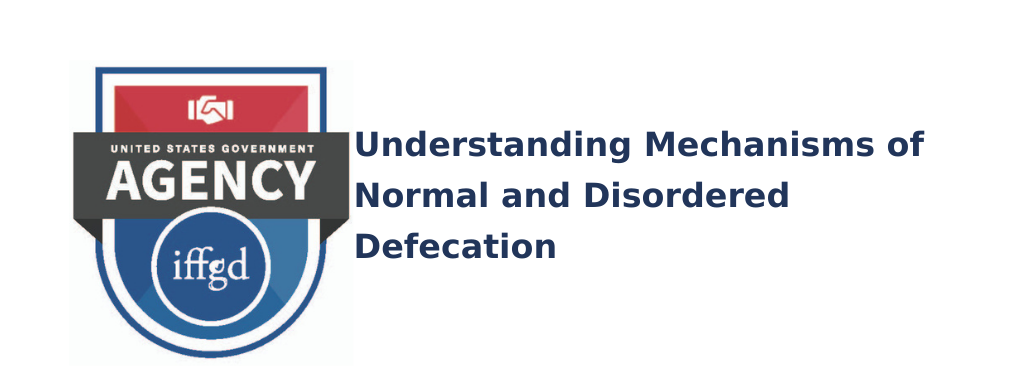
Purpose of the study: Researchers are trying to better understand why constipation occurs and improve the tests for diagnosing these conditions.
Sponsors: Mayo Clinic
Start date: January 29, 2019
Completion date: December 30, 2023
Participation: View study for all inclusion and exclusion criteria
- 18-80 years old
- All sexes
- Accepts healthy volunteers
- Inclusion Criteria
- Male and female volunteers aged 18-80 years.
- Able to provide written informed consent before participating in the study.
- Able to communicate adequately with the investigator and to comply with the requirements for the entire study.
- Individuals with chronic constipation for 1 year, with 2 or more of the following symptoms for 3 months or longer: <3 bowel motions/week, straining ≥ 25% of time, hard or lumpy stools ≥ 25% of time, anal digitation ≥ 25% of time, incomplete evacuation ≥ 25% of time, feeling of anorectal blockage ≥ 25% of time.
- Able to provide written informed consent before participating in the study.
- Able to communicate adequately with the investigator and to comply with the requirements for the entire study.
Contact:
- Kelly J Feuerhak 507-255-6802 or via email at Feuerhak.Kelly@mayo.edu
Esophageal Cancer
Added June 2021
Esophageal Cancer Risk Registry
Purpose of study: The purpose of this study is to identify markers in the blood and tissue that could indicate risk factors for the development and progression of esophagus cancer. This research aims to collect medical history, blood, and tissue samples from patients who present with an esophageal disorder. Identifying genetic and behavioral risk factors involved in the development of esophageal cancer might allow for early detection and prevention. Survival and an opportunity for a cure with esophageal cancer will depend greatly on the stage of diagnosis. Tumors can develop changes in their genetic (hereditary) make-up, and these changes can sometimes be seen in normal tissues before the development of cancer. These genetic (hereditary) changes can serve as tumor markers and can be detected using methods that study changes in genetic material like DNA and RNA. The analysis of proteins can provide additional information. By identifying changes in these molecules that are different or altered in cancer, the investigators can use methods and tests for the detection of these changes.
Sponsor: University of Pittsburgh
Collaborators: National Institutes of Health (NIH) and National Cancer Institute (NCI)
Participation: (Visit the website for more details on specific inclusion and exclusion criteria)
- Known or suspected esophageal or gastroesophageal junction malignancy
- Known Barrett’s metaplasia
- Clinical management of symptomatic gastroesophageal reflux disease (GERD)
- Achalasia
- Hiatal hernia
Start date: June 1999
Completion date: December 2050
Contact:
- Julie A Ward, BSN 412-647-8583 or email at wardj@upmc.edu
- Judy Forster, BSN 412-647-8579 forsej@upmc.edu
Short Bowel Syndrome (SBS)
**No Active Clinical Trials**
Eosinophilic Disorders
Added February 2024
Study of Gastric Motility in Eosinophilic Gastritis(OAT-FEED)
Purpose of study: The study is a cross-sectional observational study designed to determine if eosinophilic gastritis (EG) results in gastric motility impairment.
Sponsor: Children’s Hospital Medical Center, Cincinnati
Start date: January 2023
Completion date: July 2024
Participation:
Inclusion Criteria:
- 18 to 59 years old with EG
- Eosinophilic gastritis (EG) defined as at least one endoscopy with histopathologic evidence of ≥ 30 eosinophils in 5 or more high powered fields (hpf’s) with associated symptoms of EG.
- Patient reported symptoms starting at least one year or more prior to screening consistent with a diagnosis of EG: nausea, vomiting, early satiety, abdominal pain/bloating, regurgitation, diarrhea.
- Symptoms suggestive of a possible gastric motility disorder during the 60 days prior to screening including: nausea, vomiting, early satiety, post-prandial feeling of fullness or bloating.
- Tolerance and willingness to consume the oatmeal meal in this study.
Contact:
- Kara Kliewer, PhD 513-636-4821 kara.kliewer@cchmc.org
Added November 2022
Data and Sample Collection Study to Elucidate the Mechanisms of Eosinophilic Disorders
Purpose of study: The purpose of this study is to elucidate the mechanisms underlying eosinophil growth, survival, migration, and function and to investigate and further characterize the pathophysiology of, clinical manifestations of, and spectrum of disease severity of eosinophilic inflammation in humans.
Sponsor: Children’s Hospital Medical Center, Cincinnati
Start date: May 2005
Completion date: January 2050
Participation:
Patients with eosinophilic disorders and patients without eosinophilic disorders to serve as normal control
Inclusion Criteria:
- Signed informed consent obtained from the patient or parent/guardian. Assent will be obtained from all minors 11 years of age and older.
- Carrying a diagnosis of eosinophilic gastrointestinal disease, eosinophilic inflammatory disease, or food allergy OR family member, or normal control
Contact:
- Kara Kliewer, PhD 513-636-4821 kara.kliewer@cchmc.org
Added June 2022

Purpose of the study: The purpose of this observational study is to find the best measures to define how well a person with eosinophilic disorder is doing. People with EoE, EG, EGE and EC normally undergo endoscopy and/or colonoscopy where cells are collected for microscopic analysis. Treatments are then decided based on how the cells look. We are aiming to compare different tissue components such as inflammatory cell types with clinical symptoms. We want to see if scores on standard questionnaires can give us an idea how well the person is doing.
Sponsor: Children’s Hospital Medical Center
Collaborators: National Institute of Allergy and Infectious Diseases (NIAID)
National Institute of Diabetes and Digestive and Kidney Diseases (NIDDK)
ORDR
National Center for Advancing Translational Science (NCATS)
Start Date: July 2015
Completion Date: December 2050
Participation:
Inclusion Criteria:
- Males or females 3 years of age and older
- Mucosal eosinophilia: EoE ≥ 15 eosinophils/HPF in the distal or proximal esophagus, EG ≥ 30 eosinophils/HPF in 5 HPF’s in the body and/or antrum, EGE ≥ 53 eosinophils/HPF in the duodenum and/or ≥ 56 eosinophils/HPF in the jejunum and/or ileum, EC ≥ 84 eosinophils/HPF from the transverse or descending colon and/or ≥ 32 eosinophils/HPF from the rectosigmoid colon or a biopsy from any colonic location with ≥ 100 eosinophils/HPF
- Presence of symptoms is required for patients who are newly diagnosed but not required for patients who were previously diagnosed.
Exclusion Criteria:
- History of intestinal surgery other than G tube placement
- Enrolled in a blinded investigational study at the time of the first study visit
- Have esophageal stricture (<3mm)
- Have other identifiable causes for eosinophilia (except Inflammatory Bowel Disease): infections, Gastrointestinal (GI) cancer, other GI inflammatory disease (e.g., Ulcerative Colitis or Crohn’s Disease)
Contact:
- Heidi Poppendeck, MPH 513-803-3078 heidi.poppendeck@cchmc.org
- Kara Kliewer, PhD (513) 636-4821 Kara.Kliewer@cchmc.org
Added May 2021
Purpose of research: Single center observational and specimen banking study for children with eosinophilic esophagitis EoE to gauge natural history and inflammatory markers.
Sponsor: University of California, San Diego, NIH and NIAID
Participation:
Have a known EoE diagnosis
Complain of dysphagia, vomiting, or abdominal pain, especially if recalcitrant to acid blocking therapy (but does not have to be recalcitrant to acid blocking medications)
Present with food impaction
Present with esophageal stricture
Have characteristic endoscopic findings of EoE of pallor, linear furrows, lichenification, white plaques, or concentric rings
Contact:
Contact: Emad Khosh hemmat, BS 8589661700 ext 226884 ekhoshhe@Ucsd.edu
Contact: Seema S Aceves, MD, PhD 8585342983 saceves@ucsd.edu
Erosive Esophagitis
**No Active Clinical Trials**
Diverticulitis
Added September 2023
Purpose of study: This is a randomized trial (n=75) of a Mediterranean style Food Pattern and versus standardized guidance on fiber intake for patients with diverticulitis to evaluate the feasibility of this dietary intervention including willingness to randomize and adherence to a Med-style dietary pattern. The investigators will employ state-of-the-art behavioral interventions in the form of electronic feedback to improve health-related behaviors and support dietary customization based on participants’ budget, dietary preferences, and restrictions. The investigators will also examine plasma inflammatory biomarkers (interleukin-6, interleukin-10, and interleukin-1β) and fecal calprotectin at baseline, 6, and 12 months.
Sponsor: University of Washington
Collaborator: National Institute of Diabetes and Digestive and Kidney Diseases (NIDDK)
Start date: 2023-01-01
Completion date: 2025-04-01
Participation:
- Adult ≥18 years;
- Patients presenting to gastroenterologist or surgeons after recovery from an episode of diverticulitis (within the prior 18 months), either the index episode or recurrent.
- Ability to provide written informed consent in English.
Contact: Kelsey Pullar, 206-221-8247, kpullar@uw.edu
Purpose of Study: The COSMID (Comparison of Surgery and Medicine on the Impact of Diverticulitis) trial is a pragmatic, patient-level randomized superiority trial of elective colectomy vs. best medical management for patients with quality of life (QoL) limiting diverticular disease. A parallel observational cohort will include those who are disinclined to have their treatment choice randomized, but are willing to contribute information about their outcomes. The goal of the COSMID trial is to answer the question: For patients with QoL-limiting diverticular disease, is elective colectomy more effective than best medical management? The hypothesis being tested in the COSMID trial is that patient-reported outcomes (PROs) among patients in the surgery arm will be superior to those in the best medical management arm.
Sponsor: Patient Centered Outcomes Research Institute
Participation: Adults ≥18 years; At least one episode of diverticulitis confirmed by CT scan in last 5 years and a colonoscopy to rule out or screen for other colon pathology concordant with screening guidelines; AND A. History of recurrent uncomplicated diverticulitis without current symptoms (AUD in remission) over the prior 5 years; OR B. Persistent signs, symptoms, and concerns related to diverticular disease ≥3 months after recovery from an episode of AUD (e.g., excluding irritable bowel syndrome and other conditions in coordination with gastroenterologist)
Contact: Kelsey Pullar kpullar@uw.edu
Dyspepsia
***No clinical trials at this time***
Dysphagia
Added January 2022

Purpose of Study: This study will examine the effects of varying liquid viscosity on swallow physiology in infants with oropharyngeal dysphagia and brief resolved unexplained event (BRUE) and other children with dysphagia that would be at risk for symptoms of swallow dysfunction.
Sponsors: Boston Children’s Hospital
Collaborators: NIDDK
Start Date: April 1, 2021
Completion Date: August 31, 2025
Participation: See study for all inclusion and exclusion criteria
- 0-21 years of age
- ALL sexes
- NOT accepting healthy volunteers
Contact: Daniel R Duncan, MD, MPH 617-355-0897 daniel.duncan@childrens.harvard.edu
Cyclic Vomiting Syndrome
*** No clinical trials at this time***
Achalasia
Added January 2022
Assessment of Different Modified POEM for Achalasia
Purpose of study: The aims of this study are 1) to compare the efficacy and safety of conventional myotomy (long myotomy) and modified myotomy (short myotomy) in the treatment of type I/II achalasia patients diagnosed according to Chicago Classification; 2) to compare the efficacy and safety of conventional myotomy (circular myotomy) and modified myotomy (full-thickness myotomy) in the treatment of type I/II achalasia patients; 3) to compare the efficacy and safety of conventional myotomy (non-tailored myotomy) and modified myotomy (tailored myotomy) in the treatment of type III achalasia patients.
Sponsor: Peking Union Medical College Hospital
Start Date: September 2, 2020
Completion Date: December 2027
Participation: See study for all inclusion and exclusion criteria
- Age 14 to 70 years of age
- ALL sexes
- NOT accepting Healthy volunteers
Contact: Tao Guo, MD 8610-69155017 guoqiong990@126.com
Pancreatic Cancer
A Phase III Trial of Perioperative Versus Adjuvant Chemotherapy for Resectable Pancreatic Cancer
Purpose of Trial: This phase III trial compares perioperative chemotherapy (given before and after surgery) versus adjuvant chemotherapy (given after surgery) for the treatment of pancreatic cancer that can be removed by surgery (removable/resectable). Chemotherapy drugs, such as fluorouracil, irinotecan, leucovorin, and oxaliplatin, work in different ways to stop the growth of tumor cells, either by killing the cells, by stopping them from dividing, or by stopping them from spreading. Giving chemotherapy before and after surgery (perioperatively) may work better in treating patients with pancreatic cancer compared to giving chemotherapy after surgery (adjuvantly).
Sponsor: Alliance for Clinical Trials in Oncology
Participation: (Check website for further details on pre-registration criteria and registration criteria)
- 18 years of older (adult, older adult)
Start Date: July 2020
Completion Date: January 2026
Contact: Cristina R. Ferrone, MD (617)-643-6189, or email at cferrone@mgh.harvard.edu
Study of Pembrolizumab (MK-3475) in Participants With Advanced Solid Tumors (MK-3475-158/KEYNOTE-158)
Purpose of Trial: In this study, participants with multiple types of advanced (unresectable and/or metastatic) solid tumors who have progressed on standard of care therapy will be treated with pembrolizumab (MK-3475).
Sponsor: Merck Sharp & Dohme Corp
Participation: (See website for more details on inclusion and exclusion criteria)
- 18 years and older (adult, older adult)
Start Date: December 18, 2015
Completion date: June 18, 2026
Contact: Toll Free Number 1-888-577-8839 Trialsites@merck.com
Pancreatitis
Added January 2025
A Study to Evaluate the Safety and Efficacy of a Single Dose of RABI-767 in Participants with Acute Pancreatitis
Purpose of study: The goal of this clinical trial is to test the safety and effectiveness of a single dose of RABI-767 given by endoscopic ultrasound (EUS) guided peripancreatic injection in participants with predicted severe acute pancreatitis.
Sponsor: Panafina, Inc.
Start date: June 2024
Completion Date: October 2025
Participation: See website for all inclusion and exclusion criteria
- Diagnosis of acute pancreatitis
- Predicted severe acute pancreatitis, based on protocol defined criteria
- Lack of clinically meaningful improvement from status at admission, at the discretion of Investigator, at the time of randomization
- Suitable for EUS-guided study drug administration procedure
- Contrast-enhanced computed tomography (CECT) or magnetic resonance imaging (MRI) of the abdomen/pancreas available for the evaluation of exclusion criteria
Contact for study: Kelly Abernathy, 919-460-9500, kabernathy@arrivobio.com
Laryngopharyngeal reflux (LPR)
**No Clinical Trials at this time**
Liver Disease
Added January 2023

Purpose of trial: Treatment- The main aim of this study is to learn if fazirsiran reduces liver scarring (fibrosis) compared to placebo. Other aims are to learn if fazirsiran slows down the disease worsening in the liver, to get information on how fazirsiran affects the body (called pharmacodynamics), to learn if fazirsiran reduces other liver injury (inflammation) and the abnormal Z-AAT protein in the liver, to get information on how the body processes fazirsiran (called pharmacokinetics), to test how well fazirsiran works compared with a placebo in improving measures of liver scarring including imaging and liver biomarkers (substances in the blood that the body normally makes and help show if liver function is improving, staying the same, or getting worse) as well as to check for side effects in participants treated with fazirsiran compared with those who received placebo.
Sponsor: Takeda
Condition: Alpha1-Antitrypsin Deficiency
Start date: January 24, 2023
Completion date: February 28, 2028
Participation:
- The participant must have a diagnosis of the Z allele homozygotes (PiZZ) genotype AATD. PiZZ diagnosis from source verifiable medical records is permitted. Otherwise, participants must undergo PiZZ confirmatory testing (genotyping for PiS and PiZ alleles) at screening. PiMZ or PiSZ genotypes are not permitted.
- The participant, of any sex, is aged 18 to 75 years, inclusive.
- The participant’s liver biopsy core sample collected should meet the requirements of the protocol.
- The participant has evidence of METAVIR stage F2, F3, or F4 liver fibrosis, evaluated by a centrally read baseline liver biopsy during the screening period; or confirmed as meeting all the entry criteria by central reading of a previous biopsy conducted within 6 months before the estimated enrollment date using an adequate liver biopsy and slides as defined in the histopathology manual. The histopathology manual must be followed for all liver biopsies as study standard operating procedure.
- The participant has a pulmonary status meeting the protocol’s requirements.
- It must be confirmed that the participant does not have HCC. Participants will be screened for HCC with alpha-fetoprotein (AFP) and abdominal ultrasound. If the participant has any of the following, they will be required to have contrast-enhanced CT or MRI imaging to exclude HCC before randomization.
- An adult participant must have a body mass index (BMI) between 18.0 and 39.0 kilograms per meter square (kg^m2), inclusive.
- The participant is a nonsmoker (defined as does not smoke cigarettes daily for at least 12 months before screening) with current nonsmoking status confirmed by urine cotinine at screening.
Contact: 1-877-825-3327 https://www.theredwoodliverstudy.com/
Porphyria
Longitudinal Study of the Porphyrias
Sponsor: Icahn School of Medicine at Mount Sinai
Start Date: November 1, 2010
Completion Date: June 2025
Participation:
Inclusion Criteria:
- Individuals with a documented diagnosis of a porphyria.
- For each type of porphyria, the inclusion criteria are based on
- Biochemical findings, as documented by laboratory reports (or copies) of porphyria-specific testing performed after 1980 (Absolute values are preferred for diagnostic biochemical thresholds. Fold increases in comparison to an upper (or lower) limit of normal (ULN or LLN) are also acceptable, but are complicated by considerable variation between laboratories in normal limits. Equivocal biochemical measurements may require confirmation by a consortium reference laboratory;)
- molecular findings documenting the identification of a mutation in a porphyria-related gene.
- In addition, an individual or a parent or guardian must be willing to give written informed consent or assent, as appropriate.
- Provision is made for enrolling relatives who may not have symptoms but have biochemical or molecular documentation of a porphyria, or in the case of recessive disorders carry a disease-related mutation.
Contact: Karli Hedstrom, MPH 212-659-1450 karli.hedstrom@mssm.edu
NCT01561157
ELEVATE, a Registry of Patients With Acute Hepatic Porphyria (AHP) (ELEVATE)
Purpose of the Study: This global patient registry is being conducted to characterize the natural history and real-world clinical management of patients with AHP, and to further characterize the real-world safety and effectiveness of givosiran and other approved AHP therapies.
Sponsors: Alnylam Pharmaceuticals
Start date: April 26, 2021
Completion date: April 2027
Participation:
- 12 Years and older (Child, Adult, Older Adult )
- Documented diagnosis of AHP, per physician’s determination
H. Pylori
** No active clinical trials



